An incident on social network
那一刻我意识到健康有多重要英语作文

In the ceaseless hustle and bustle of life, it is all too easy to take one's health for granted, until that fateful moment arrives, casting a stark spotlight on its true worth. This essay serves as a testament to the profound realization I had about the paramount importance of health, an awakening that was both humbling and transformative. It is an exploration of this realization from multiple angles, underscoring the intricate interplay between physical, mental, social, and emotional well-being, and their collective influence on the quality and meaning of our lives.The turning point in my understanding of health's significance came when a dear friend, whom I had always perceived as robust and full of vitality, was diagnosed with a severe illness. Overnight, his life, once characterized by boundless energy and zest, was consumed by hospital visits, medications, and a relentless battle against a formidable adversary. Witnessing his sudden decline and the arduous journey towards recovery, I was confronted with the stark reality that health is not an inviolable given but a fragile treasure that must be cherished and nurtured.First and foremost, physical health forms the bedrock of our overall well-being. It is the foundation upon which we build our lives, enabling us to engage in daily activities, pursue our passions, and contribute to society. The fragility of this foundation became acutely apparent when my friend's illness rendered him incapable of performing even the most basic tasks without assistance. His ordeal underscored the fact that health is not merely the absence of disease, but a state of optimal functioning of the body, where every organ and system works harmoniously, allowing us to live life to the fullest.Physical health is also intricately linked to our ability to maintain independence and autonomy. A healthy body allows us to make choices about how we live our lives, where we go, what we do, and who we spend time with. Conversely, poor health can strip us of these freedoms, confining us to hospitals, care facilities, or even our own homes, reliant on others for support. The sight of my friend, once a vibrant explorer of the world, now confined to his room, wasa poignant reminder of the centrality of physical health in preserving our personal sovereignty.Moreover, the impact of physical health extends beyond the individual, resonating within families and communities. When someone falls ill, it is not just their life that is disrupted; loved ones bear the emotional and often financial burden of caregiving. The strain on relationships, the reshuffling of priorities, and the pervasive sense of uncertainty can ripple through an entire network. My friend's illness brought his family together in a shared mission of support, yet it also exposed them to immense stress and worry. This experience drove home the point that investing in our health is not merely a personal responsibility, but a gesture of love and consideration for those around us.Beyond the physical realm, the episode also illuminated the profound connection between health and mental well-being. My friend's struggle with illness not only tested his body but also took a significant toll on his psyche. The fear, anxiety, and depression that accompanied his diagnosis and treatment highlighted the undeniable truth that mental health is an integral part of overall health. It is the lens through which we perceive the world, influencing our thoughts, emotions, and behaviors. A healthy mind fosters resilience, enabling us to cope with life's challenges, while compromised mental health can impede our ability to function effectively and derive joy from life.Furthermore, the incident shed light on the often-overlooked intersection between physical and mental health. Poor physical health can trigger or exacerbate mental health issues, while mental distress can undermine physical well-being. The two are inextricably intertwined, necessitating a holistic approach to healthcare that addresses both aspects concurrently. Watching my friend navigate the complex interplay between his physical ailment and the emotional turmoil it unleashed, I came to appreciate the need for a comprehensive understanding of health that transcends the mere treatment of symptoms.Lastly, the episode underscored the role of health in shaping our sociallives and relationships. Good health enables us to participate actively in society, fostering connections, building communities, and contributing to the collective good. On the other hand, ill health can isolate individuals, disrupting social networks and diminishing their sense of belonging. As my friend's illness forced him to withdraw from his usual social activities, I witnessed the void it created in his life and the lives of those around him. It was a poignant reminder that health is not just a private matter; it is a vital component of our social fabric.In conclusion, the moment I witnessed the stark consequences of ill health in the life of a dear friend was a watershed moment in my understanding of the inestimable value of health. It was a stark reminder that health encompasses far more than the mere absence of disease; it is a multifaceted concept encompassing physical, mental, social, and emotional well-being. It is the bedrock upon which we build our lives, the key to our independence, the cornerstone of our relationships, and the fuel for our engagement with the world. This epiphany has instilled in me a deep reverence for health and a steadfast commitment to nurturing it in every aspect of my life. For indeed, in the grand tapestry of life, nothing is more precious than the gift of good health.。
高二英语译林版2020选择性必修第一册同步课件 Unit 2 Period 1 单元知识详解

占据,拥有(人作主语)
in the possession of sb.=in one’s possession
某物为某人所有(物作主语)
personal possessions
私人物品
【知识拓展】
(1)overcome the difficulty/barrier
克服困难/障碍
(2)be overcome by/with
受到……的极大影响
8.possess vt.具有(特质);拥有;支配,控制 【知识微练】 单句语法填空 ①(2020·全国Ⅰ卷)All customers travelling on TransLink services must be in _p_o_s_s_e_ss_i_o_n_(possess) of a valid ticket before boarding. ②There are several reasons to believe that the urges to help,inform and share are not taught,but naturally _p__o_ss_e_s_s_ed__(possess) in young children. ③We were told that we could take only a few personal _p_o_s_s_e_ss_i_o_n_s_(possess) with us.
【知识拓展】
(1)deserve sth.
值得……
(2)deserve to do sth.
应该做某事
(3)deserve due respect
值得应有的尊重
(4)deserve doing=deserve to be done
如何保证网络安全英语作文80个词
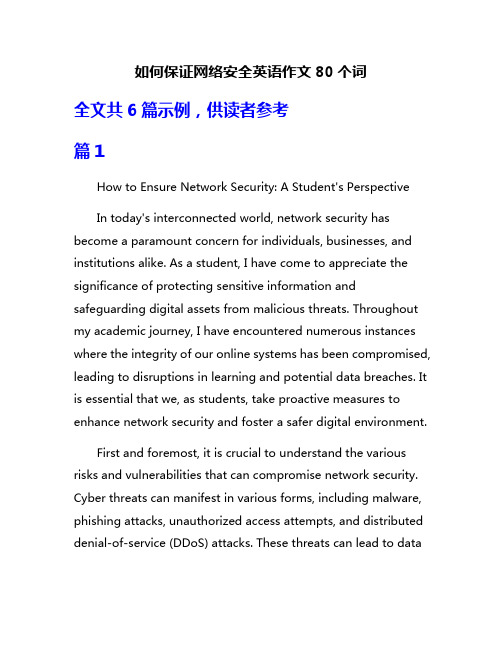
如何保证网络安全英语作文80个词全文共6篇示例,供读者参考篇1How to Ensure Network Security: A Student's PerspectiveIn today's interconnected world, network security has become a paramount concern for individuals, businesses, and institutions alike. As a student, I have come to appreciate the significance of protecting sensitive information and safeguarding digital assets from malicious threats. Throughout my academic journey, I have encountered numerous instances where the integrity of our online systems has been compromised, leading to disruptions in learning and potential data breaches. It is essential that we, as students, take proactive measures to enhance network security and foster a safer digital environment.First and foremost, it is crucial to understand the various risks and vulnerabilities that can compromise network security. Cyber threats can manifest in various forms, including malware, phishing attacks, unauthorized access attempts, and distributed denial-of-service (DDoS) attacks. These threats can lead to datatheft, system downtime, and reputational damage, all of which can have severe consequences for our academic pursuits.One of the most effective ways to mitigate these risks is through the implementation of robust authentication measures. Strong passwords, multi-factor authentication, and biometric identification methods can significantly reduce the likelihood of unauthorized access to our networks and accounts. Additionally, regular software updates and patches should be applied promptly to address known vulnerabilities and fortify our systems against emerging threats.Another critical篇2How to Ensure Internet SecurityThe internet has become an integral part of our daily lives, connecting us with the world and providing access to a vast array of information and resources. However, with this incredible convenience comes the risk of cyber threats, which can compromise our personal information, financial data, and online safety. As students, we rely heavily on the internet for research, communication, and entertainment, making it crucial tounderstand the importance of internet security and take proactive measures to protect ourselves.One of the primary threats to internet security is malware, which includes viruses, worms, Trojan horses, and spyware. These malicious programs can infiltrate our devices through various means, such as infected websites, email attachments, or even seemingly harmless downloads. Once installed, malware can cause significant damage, including data theft, system crashes, and unauthorized access to our personal information. To combat this threat, it is essential to keep our operating systems, web browsers, and other software up-to-date with the latest security patches and updates. Additionally, using a reputable antivirus program and regularly scanning our devices can help detect and remove any existing malware.Another critical aspect of internet security is password management. Strong, unique passwords are the first line of defense against unauthorized access to our online accounts. However, with the proliferation of online services, it can be tempting to reuse the same password across multiple platforms, putting our digital lives at risk if any one of those accounts is compromised. To mitigate this risk, it is recommended to use a password manager, which can generate and store strong, uniquepasswords for each account, eliminating the need to memorize multiple complex passwords.Phishing attacks are another significant threat to internet security. These attacks involve fraudulent attempts to obtain sensitive information, such as login credentials or financial data, by masquerading as a trustworthy entity. Phishing emails and websites can appear remarkably convincing, making it challenging to distinguish them from legitimate sources. To protect against phishing attacks, it is essential to be vigilant and scrutinize any unsolicited requests for personal information, even if they appear to come from reputable sources. Additionally, enabling two-factor authentication (2FA) on our online accounts can provide an extra layer of security, requiring a second form of verification beyond just a password.As students, we often collaborate and share information online, which can pose additional security risks. When sharing files or documents, it is crucial to ensure that sensitive information is not inadvertently exposed. Encrypting sensitive data before sharing it and using secure file-sharing platforms can help mitigate these risks.Furthermore, public Wi-Fi networks, while convenient, can be a potential security hazard. These networks are oftenunsecured, making it easier for cybercriminals to intercept and exploit our online activities. When using public Wi-Fi, it is recommended to avoid accessing sensitive information or conducting financial transactions. Additionally, using a virtual private network (VPN) can create a secure, encrypted connection, protecting our online activities from prying eyes.Educating ourselves about internet security best practices is an ongoing process. As technology evolves, so do the threats and vulnerabilities. Staying informed about the latest cybersecurity trends, attending workshops or seminars, and regularly reviewing and updating our security measures can help us stay ahead of potential risks.In conclusion, ensuring internet security is a shared responsibility that requires proactive measures from all of us. By implementing strong passwords, keeping our software and systems up-to-date, recognizing and avoiding phishing attempts, practicing safe file-sharing techniques, and using secure connections, we can significantly reduce our exposure to cyber threats. As students, we have a unique opportunity to not only protect ourselves but also to become advocates for internet security, promoting awareness and best practices among our peers and communities.篇3How to Ensure Network SecurityIn today's digital age, where almost every aspect of our lives is connected to the internet, network security has become a paramount concern. As students, we heavily rely on the internet for research, assignments, and communication, making it crucial to understand the importance of protecting our online activities and data from cyber threats. In this essay, we will explore various strategies and best practices to ensure network security.Firstly, it is essential to understand the different types of cyber threats that can compromise our network security. These threats can range from malware, such as viruses, worms, and Trojans, to phishing attacks, where hackers attempt to trick us into revealing sensitive information like passwords or credit card details. Additionally, we must be wary of distributeddenial-of-service (DDoS) attacks, which aim to overwhelm a network or system with excessive traffic, rendering it inaccessible.One of the most fundamental steps in ensuring network security is implementing strong and unique passwords for all our accounts. It is recommended to use a combination of uppercaseand lowercase letters, numbers, and special characters to create a robust password that is difficult to guess or crack. Furthermore, we should avoid using the same password across multiple accounts, as a breach in one account could compromise the security of all our other accounts.Another crucial aspect of network security is keeping our software and operating systems up-to-date. Software vendors regularly release patches and updates to address vulnerabilities and security flaws in their products. By neglecting these updates, we leave our systems susceptible to exploitation by cybercriminals. It is advisable to enable automatic updates whenever possible or regularly check for and install the latest security updates manually.As students, we often find ourselves accessing public Wi-Fi networks, whether on campus or in cafes and other public spaces. While convenient, these networks can pose a significant security risk if not used cautiously. It is recommended to avoid accessing sensitive information or performing financial transactions over public Wi-Fi networks, as they are generally unsecured and can be easily compromised by hackers. If you must use public Wi-Fi, consider using a virtual private network (VPN) to encrypt your internet traffic and protect your data from prying eyes.Antivirus and anti-malware software are also essential tools in our arsenal against cyber threats. These programs are designed to detect and remove malicious software from our devices, preventing them from causing harm or stealing sensitive information. It is crucial to keep these programs up-to-date and regularly scan our devices for any potential threats.Furthermore, we should exercise caution when opening emails or downloading files from untrusted sources. Cybercriminals often exploit email attachments and downloads to distribute malware or gain unauthorized access to our systems. Always verify the legitimacy of the sender and the content before opening any attachments or downloading files.In addition to these technical measures, it is equally important to adopt safe browsing habits and maintain a healthy skepticism when navigating the internet. Be wary of unsolicited emails or messages, especially those containing links or attachments, as they could be part of a phishing or social engineering attack. Cross-check the authenticity of websites before entering any personal or financial information, and be cautious of suspicious pop-ups or prompts.Lastly, it is crucial to back up our data regularly, either locally or in the cloud. In the event of a cyber attack or system failure,having a recent backup can help us recover our data and minimize the impact of the incident.In conclusion, ensuring network security is a shared responsibility that requires vigilance and proactive measures from all of us. By implementing strong passwords, keeping our software up-to-date, exercising caution when using public Wi-Fi networks, utilizing antivirus and anti-malware software, maintaining safe browsing habits, and regularly backing up our data, we can significantly reduce the risk of falling victim to cyber threats and protect our online activities and personal information.篇4How to Ensure Internet SecurityIn today's digital age, the internet has become an indispensable part of our lives. From online shopping and banking to social networking and entertainment, we rely heavily on the internet for various purposes. However, with the increasing use of the internet, the risk of cyber threats and security breaches has also grown significantly. As a student, it is crucial to understand the importance of internet security andtake necessary measures to protect myself from potential threats.The first and foremost step to ensure internet security is to use strong and unique passwords for all my online accounts. Weak or easily guessable passwords can make my accounts vulnerable to hackers and cyber criminals. It is recommended to use a combination of letters, numbers, and special characters in my passwords, and to change them regularly. Additionally, I should never share my passwords with anyone or write them down in easily accessible places.Another essential aspect of internet security is to keep my software and operating systems up-to-date. Software updates often include security patches that fix vulnerabilities and protect against potential threats. By regularly updating my computer, mobile devices, and applications, I can reduce the risk ofcyber-attacks and data breaches.Antivirus and anti-malware software are also crucial for maintaining internet security. These programs can detect and remove viruses, malware, and other malicious software from my devices, preventing them from causing harm or stealing sensitive information. It is important to choose reputable and reliableantivirus and anti-malware solutions and keep them updated regularly.When browsing the internet, I should be cautious about the websites I visit and the links I click on. Cybercriminals often use tactics like phishing and social engineering to trick users into revealing sensitive information or downloading malware. I should always verify the authenticity of websites and links before entering any personal or financial information.Furthermore, I should be mindful of the information I share online, especially on social media platforms. Oversharing personal details or posting sensitive information can make me vulnerable to identity theft or other cyber threats. It is advisable to review my privacy settings regularly and limit the amount of personal information I share publicly.In addition to these measures, it is essential to educate myself about the latest cyber threats and security best practices. Attending workshops, reading articles, or taking online courses can help me stay informed and better equipped to protect myself from potential risks.As a student, I may also have access to sensitive academic or research data. In such cases, it is crucial to follow the institution's security protocols and guidelines to ensure the confidentialityand integrity of the data. This may include using secure networks, encrypting sensitive files, and adhering to strict access controls.Internet security is not just a one-time effort; it requires ongoing vigilance and proactive measures. By implementing these practices, I can significantly reduce the risk of falling victim to cyber threats and protect my personal and academic information from potential harm.In conclusion, ensuring internet security is a responsibility that we all share. As a student, I must take the necessary steps to safeguard my online presence and data. By using strong passwords, keeping my software and systems updated, employing antivirus and anti-malware solutions, being cautious while browsing the internet, and educating myself about cyber threats, I can navigate the digital world with confidence and minimize the risks associated with internet usage.篇5How to Ensure Internet SafetyThe internet has become an integral part of our daily lives, providing us with an incredible wealth of information and opportunities for communication and collaboration. However, with the countless benefits that the internet offers, there are alsoinherent risks and threats to our online safety and security. As students, we must be proactive in protecting ourselves from these dangers and ensuring that our online experiences are secure and enjoyable.One of the primary concerns when it comes to internet safety is the threat of cybercrime. Cybercriminals are constantly seeking to exploit vulnerabilities in our systems, steal our personal information, and wreak havoc through various means, such as hacking, phishing, and malware attacks. To combat these threats, it is crucial that we take measures to strengthen our online defenses.First and foremost, we must prioritize the use of strong and unique passwords for all our online accounts. Weak or easily guessable passwords are a prime target for hackers, and using the same password across multiple accounts only compounds the risk. Consider using a password manager to generate and store complex passwords for each account, ensuring that even if one account is compromised, the others remain secure.Additionally, we should be vigilant about the information we share online and the websites we visit. Social engineering tactics, such as phishing emails and fake websites, are designed to trick us into divulging sensitive information or installing malicioussoftware. Always verify the legitimacy of websites and email senders before clicking on links or providing personal data.Another essential aspect of internet safety is the protection of our devices. Keeping our operating systems, web browsers, and other software up-to-date with the latest security patches is crucial, as these updates often address known vulnerabilities and close potential entry points for cyber threats. Furthermore, the use of reliable antivirus and anti-malware software can provide an additional layer of protection against malicious code and other online threats.In the realm of social media, it is imperative that we exercise caution and maintain a certain level of privacy. While social platforms offer a means of connecting with others and sharing our experiences, oversharing personal information or engaging with strangers can potentially put us at risk. We should carefully review and adjust our privacy settings to control who can access our personal data and content.Moreover, as students, we must be mindful of the content we consume and share online. Engaging with or spreading misinformation, hate speech, or illegal content can not only compromise our online safety but also have broader societal implications. It is our responsibility to be critical consumers ofinformation and to promote a positive and ethical online environment.Finally, it is essential that we educate ourselves and stay informed about the latest trends and threats in the realm of internet safety. Attending workshops, reading articles, and participating in discussions on this topic can help us stay ahead of emerging risks and adopt best practices for protecting ourselves online.In conclusion, ensuring internet safety is a collective responsibility that requires vigilance, proactive measures, and a commitment to ethical online behavior. By implementing strong security practices, being cautious about the information we share and the websites we visit, and promoting a positive online culture, we can navigate the digital landscape with confidence and minimize the risks to our safety and privacy.篇6How to Ensure Internet Security: A Student's GuideIn today's digital age, the internet has become an integral part of our lives, providing us with a wealth of information and opportunities. However, as we embrace the convenience of the online world, we must also be mindful of the risks and threatsthat come with it. Cybersecurity is a critical issue that affects everyone, especially students who rely heavily on the internet for their studies and social interactions. As a student, it is crucial to understand the importance of internet security and take proactive measures to protect yourself and your personal information.One of the most significant threats to internet security is cybercrime, which includes activities such as hacking, identity theft, and online fraud. Cybercriminals are constantly developing new tactics to exploit vulnerabilities and gain unauthorized access to systems and data. They may use phishing scams, malware, or social engineering techniques to trick users into revealing sensitive information or granting access to their devices. As a student, you may be targeted by these malicious actors, putting your academic records, financial information, and personal data at risk.To ensure your online safety, it is essential to implement robust security measures. First and foremost, use strong and unique passwords for all your online accounts. Avoid using easily guessable passwords, such as your name or date of birth, and consider using a password manager to generate and store complex passwords securely. Additionally, enable two-factorauthentication (2FA) whenever possible, as this adds an extra layer of security to your accounts.Another crucial aspect of internet security is keeping your software and devices up to date. Regularly update your operating system, web browsers, and other applications to ensure that you have the latest security patches and bug fixes. Outdated software can leave your devices vulnerable to exploitation by cybercriminals.When browsing the internet, exercise caution and be wary of suspicious links or attachments, especially from unknown sources. Cybercriminals often use these tactics to spread malware or gain access to your personal information. Always verify the authenticity of websites and emails before providing any sensitive data or clicking on links.Furthermore, be mindful of the information you share online. Limit the amount of personal information you disclose on social media platforms and other public forums. Cybercriminals can use this information to craft targeted attacks or engage in identity theft.As a student, you may also need to access school networks or use shared computers on campus. In such cases, it is crucial to follow your institution's security policies and guidelines. Avoidsaving sensitive information on shared devices, and always log out or lock your workstation when leaving it unattended.In addition to these practical measures, it is essential to educate yourself about the latest cybersecurity threats and best practices. Stay informed by reading reputable sources and attending seminars or workshops offered by your school or local community. Knowledge is power, and understanding the potential risks and how to mitigate them can go a long way in protecting your online safety.Finally, remember that internet security is a shared responsibility. Encourage your peers, family, and friends to adopt good security practices as well. By working together and raising awareness, we can create a safer online environment for everyone.In conclusion, ensuring internet security as a student is of utmost importance. By implementing strong passwords, enabling multi-factor authentication, keeping software up to date, exercising caution when browsing online, limiting the sharing of personal information, following institutional policies, and staying informed about cybersecurity threats, you can significantly reduce your risk of falling victim to cybercrime. Remember, your online safety is in your hands, and takingproactive measures can help protect your academic pursuits, personal data, and overall well-being in the digital realm.。
Social Medias Impact on Society
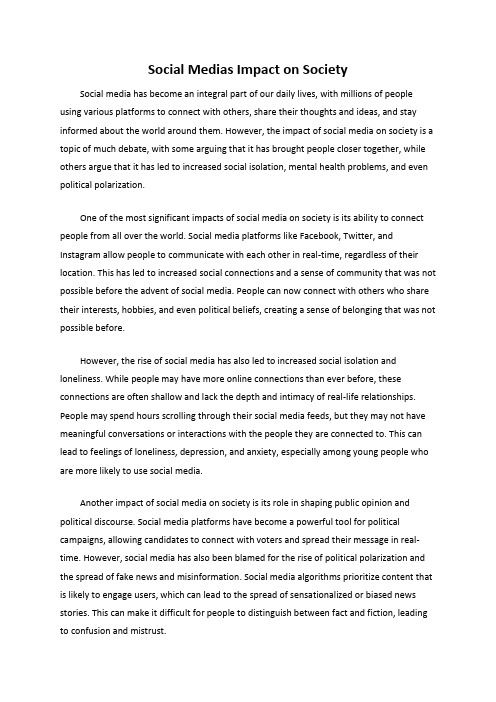
Social Medias Impact on SocietySocial media has become an integral part of our daily lives, with millions of people using various platforms to connect with others, share their thoughts and ideas, and stay informed about the world around them. However, the impact of social media on society is a topic of much debate, with some arguing that it has brought people closer together, while others argue that it has led to increased social isolation, mental health problems, and even political polarization.One of the most significant impacts of social media on society is its ability to connect people from all over the world. Social media platforms like Facebook, Twitter, and Instagram allow people to communicate with each other in real-time, regardless of their location. This has led to increased social connections and a sense of community that was not possible before the advent of social media. People can now connect with others who share their interests, hobbies, and even political beliefs, creating a sense of belonging that was not possible before.However, the rise of social media has also led to increased social isolation and loneliness. While people may have more online connections than ever before, these connections are often shallow and lack the depth and intimacy of real-life relationships. People may spend hours scrolling through their social media feeds, but they may not have meaningful conversations or interactions with the people they are connected to. This can lead to feelings of loneliness, depression, and anxiety, especially among young people who are more likely to use social media.Another impact of social media on society is its role in shaping public opinion and political discourse. Social media platforms have become a powerful tool for political campaigns, allowing candidates to connect with voters and spread their message in real-time. However, social media has also been blamed for the rise of political polarization and the spread of fake news and misinformation. Social media algorithms prioritize content that is likely to engage users, which can lead to the spread of sensationalized or biased news stories. This can make it difficult for people to distinguish between fact and fiction, leading to confusion and mistrust.Furthermore, social media has also been linked to mental health problems, particularly among young people. Studies have shown that excessive social media use can lead to feelings of anxiety, depression, and low self-esteem. Social media platforms are designed to be addictive, with notifications and likes triggering the release of dopamine in the brain. This can lead to a cycle of compulsive social media use that can be difficult to break. Additionally, social media can expose people to cyberbullying and harassment, which can further exacerbate mental health problems.Despite these negative impacts, social media has also been credited with bringing attention to important social and political issues. Social media campaigns have been instrumental in raising awareness about issues like police brutality, climate change, and LGBTQ rights. Social media has also been used to organize protests and rallies, allowing people to come together and demand change. Without social media, many of these issues may not have received the attention they deserve.In conclusion, social media has had a significant impact on society, both positive and negative. While it has brought people closer together and allowed for greater connectivity, it has also led to increased social isolation, mental health problems, and political polarization. It is important for individuals to be aware of the potential negative impacts of social media and to use it responsibly. Social media platforms also have a responsibility to address these issues and to create a safer, more positive online environment for their users.。
网络安全英语怎么说
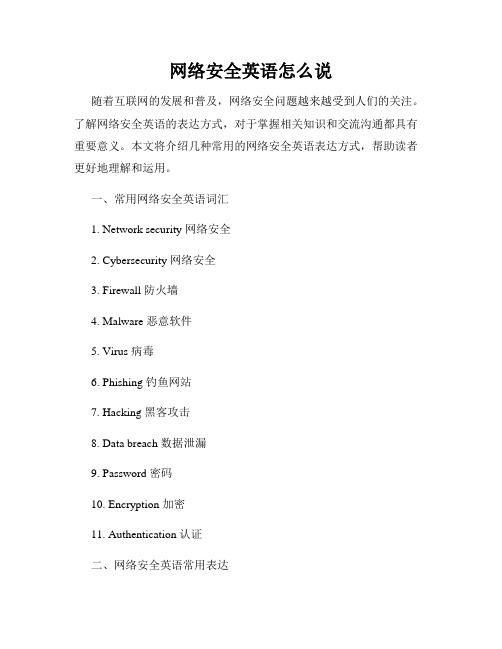
网络安全英语怎么说随着互联网的发展和普及,网络安全问题越来越受到人们的关注。
了解网络安全英语的表达方式,对于掌握相关知识和交流沟通都具有重要意义。
本文将介绍几种常用的网络安全英语表达方式,帮助读者更好地理解和运用。
一、常用网络安全英语词汇1. Network security 网络安全2. Cybersecurity 网络安全3. Firewall 防火墙4. Malware 恶意软件5. Virus 病毒6. Phishing 钓鱼网站7. Hacking 黑客攻击8. Data breach 数据泄漏9. Password 密码10. Encryption 加密11. Authentication 认证二、网络安全英语常用表达1. Protect personal information 保护个人信息In order to maintain network security, it is important to protect personal information such as passwords, bank account details, and home addresses.2. Install antivirus software 安装反病毒软件To prevent malware and viruses from infecting your computer, it is recommended to install reliable antivirus software and regularly update it.3. Be cautious about phishing emails 注意钓鱼邮件Phishing emails are designed to trick users into revealing personal information. It is important to be cautious and not click on suspicious links or provide sensitive information in response to such emails.4. Use strong passwords 使用强密码A strong password contains a combination of letters, numbers, and symbols. It is advisable to use different passwords for different online accounts and change them regularly to enhance security.5. Keep software up to date 保持软件更新Software updates often include security patches and bug fixes. It is crucial to regularly update operating systems, web browsers, and other software to protect against potential vulnerabilities.6. Enable two-factor authentication 启用双重身份认证Two-factor authentication adds an extra layer of security by requiring users to provide two forms of identification, such as a password and a unique verification code sent to their mobile device.7. Regularly backup data 定期备份数据In case of a data breach or system failure, regularly backing up important files and data is essential to prevent loss and ensure quick recovery.三、网络安全英语扩展阅读除了基本的网络安全英语词汇和常用表达,了解一些扩展阅读内容也有助于进一步提升网络安全意识和英语表达能力。
网络时代的隐私保护英语作文
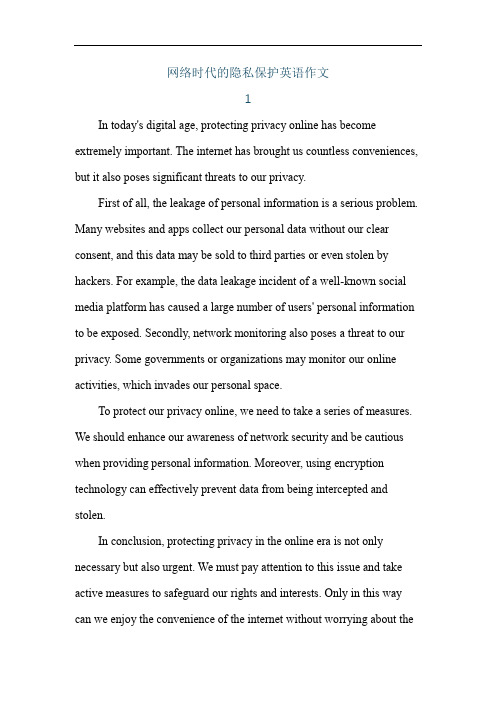
网络时代的隐私保护英语作文1In today's digital age, protecting privacy online has become extremely important. The internet has brought us countless conveniences, but it also poses significant threats to our privacy.First of all, the leakage of personal information is a serious problem. Many websites and apps collect our personal data without our clear consent, and this data may be sold to third parties or even stolen by hackers. For example, the data leakage incident of a well-known social media platform has caused a large number of users' personal information to be exposed. Secondly, network monitoring also poses a threat to our privacy. Some governments or organizations may monitor our online activities, which invades our personal space.To protect our privacy online, we need to take a series of measures. We should enhance our awareness of network security and be cautious when providing personal information. Moreover, using encryption technology can effectively prevent data from being intercepted and stolen.In conclusion, protecting privacy in the online era is not only necessary but also urgent. We must pay attention to this issue and take active measures to safeguard our rights and interests. Only in this way can we enjoy the convenience of the internet without worrying about thethreat to our privacy.2In today's digital age, the internet has become an integral part of our lives. We communicate, shop, and socialize online. But with this convenience comes the issue of privacy protection.Privacy protection refers to safeguarding personal information from being accessed, used, or disclosed without consent. It includes various aspects such as name, address, phone number, and financial details.To protect our privacy, we can take several measures. Technically, we can use strong passwords and keep our software updated. We should also be cautious when sharing information on social media and avoid clicking on suspicious links. For instance, some companies have faced severe penalties for mishandling customer data. On the other hand, advanced technologies like encryption and virtual private networks (VPNs) help secure our online activities.In conclusion, privacy protection is of great significance. It gives us a sense of security and allows us to freely enjoy the benefits of the internet without worrying about our personal information being exposed.3In today's digital age, privacy protection has become a significant concern. With the rapid development of the Internet, people's personal information is more easily exposed and at risk. For example, somecelebrities have suffered greatly due to the leakage of their private information, which has seriously affected their lives and careers.The main reasons for this problem are as follows. Firstly, the Internet has made it easier for information to be collected and shared. Many websites and apps collect users' data without their clear consent. Secondly, some hackers and criminals deliberately steal personal information for illegal purposes.To solve these problems, several strategies should be implemented. First, the government should strengthen the legislation and supervision of network privacy protection. Second, companies and websites need to enhance their security measures to prevent data leakage. Moreover, individuals should also raise their awareness of protecting their own privacy, such as being cautious when sharing personal information online.In conclusion, protecting privacy in the Internet era is crucial. We need the joint efforts of the government, enterprises and individuals to create a safe and reliable online environment. With these efforts, we can look forward to a better future where everyone's privacy is respected and protected.4The purpose of this investigation is to reveal the real situation of privacy protection in the Internet era.The methods used include online questionnaires and face-to-faceinterviews.The investigation results show that most people have a certain awareness of the importance of privacy protection on the Internet. However, the degree of awareness varies among different age groups. Young people tend to be more cautious and have taken more measures such as using complex passwords and avoiding sharing personal information randomly. In contrast, the elderly may have relatively weak awareness and are less likely to take effective protection measures.In terms of regional differences, people in developed regions are generally more concerned about privacy protection and have better protection habits. While in some less developed areas, the awareness and measures of privacy protection are relatively insufficient.Analysis of these results suggests that education and publicity about privacy protection need to be strengthened. We should provide more channels and resources for people to learn how to protect their privacy on the Internet.In conclusion, privacy protection in the Internet era is a serious issue that requires everyone's attention and effort. We should constantly improve our awareness and take practical actions to safeguard our privacy.5In the digital age, a significant incident occurred recently regardingprivacy protection.A well-known social media platform suffered a massive data breach, exposing the personal information of millions of users.This included sensitive details such as names, addresses, and phone numbers.The impact was far-reaching.Users were left feeling vulnerable and anxious about their privacy being compromised.Many faced the threat of identity theft and unwanted solicitations.The reaction from various sectors was swift.The affected platform issued public apologies and promised to enhance their security measures.They also offered assistance to affected users.Regulatory authorities launched investigations to hold the platform accountable and ensure such incidents do not recur.Several companies, in response, have introduced new privacy protection policies.They have strengthened data encryption and implemented strict access controls to safeguard user data.In conclusion, the incident serves as a stark reminder of the importance of privacy protection in the online world.We must all remain vigilant and demand stronger safeguards toprotect our personal information.。
保护个人隐私的英语作文

保护个人隐私的英语作文科技的发展,对于个人隐私的保护你们的想法是怎么样的?和下面的英语作文中的一样吗?下面是给大家整理了保护个人隐私英语写作范文,供大家参阅!保护个人隐私的英语作文篇1 I was very busy last weekend. The weather was very fine. On Saturday morning, My parents and I went to the West lake, and took many photos. Then, we went KFC for lunch. The food was very delicious. But it was not healthy. I had a hamburger, a glass of cola and some vegetable soup. I liked it. In the afternoon, I stayed at home and read some books and did my homework. It was a very nice day.On Sunday, We cleaned the room and climbed Chen Huang mountains, I swept the floor, My father washed clothes, And my mother cleaned windows. The rooms were as new as before. On Chen Huang mountain, We went jogging and played volleyball. On the mountain, trees were very green, and the air was very clean. In the afternoon, I watched a film at Qing Chun cinema. I had a good time there.In the evening, I started my English class at 4:00 and the class was over at 7:30. I read the English story and learnedsome new words and key sentences.I had a very nice weekend. I was very happy. Did you havea good weekend like me? Could you tell me?保护个人隐私的英语作文篇2 Do you worry that your private information such as address, salary or telephone number on Internet will be let out without your permission? This has become the common for many people。
社交媒体 Social Media 英语作文
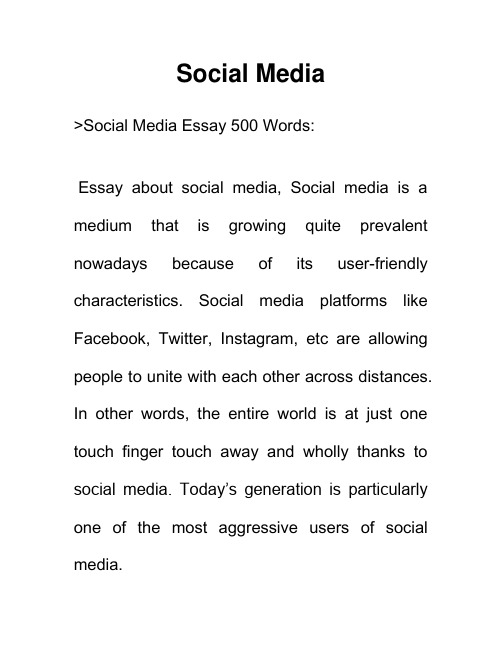
Social Media>Social Media Essay 500 Words:Essay about social media, Social media is a medium that is growing quite prevalent nowadays because of its user-friendly characteristics. Social media platforms like Facebook, Twitter, Instagram, etc are allowing people to unite with each other across distances. In other words, the entire world is at just one touch finger touch away and wholly thanks to social media. Today’s generation is particularly one of the most aggressive users of social media.Social Media Essay 500 Words in EnglishAll this presents you gape that something so compelling and with such a huge reach cannot be all stable. Just like there are two sides to a coin, in the same way, social media has its advantages and disadvantages. Consequently, several people have varying opinions on this controversial topic. So, here we will discuss the benefits and drawbacks of social media essay for class 10 and essay on social media for class 12.“Don’t Use Social media to impress people; use it to impact people.”Merits of Social MediaWhen we see the positive features of social media, we find many benefits. The most notable being a magnificent source of education. All the knowledge one wants is just a snap away. Learners can teach themselves on different topics using social media. Furthermore, live talks are now achievable because of this medium. You can visit a lecture occurring in America while you are seated here in India. Moreover, as larger the people are distancing themselves from publications, they are getting dependent on social media for stories. You are constantlyrefreshed on the latest happenings of the environment through it.A person grows more socially informed of the matters of the world. Also, it reinforces bonds with your cherished ones. Distance is not a limitation anymore with the help of social media. For a case, you can quickly interact with your friends and relatives abroad. Most importantly, it further provides a comprehensive platform for young aspiring artists to showcase their skills for free. You can perceive great possibilities for a job through social media too. Another advantage serves companies who want to promote theirtrademarks. Social media has converted a hub for promotion and proposes you great shots for combining with the customer.De-merits of Social MediaInstead of holding such huge advantages, social media is deemed to be one of the most dangerous elements of society. If the usage of social media is not controlled, it can commence to grave outcomes. It is dangerous because it penetrates your isolation like never before. The oversharing incident on social media delivers children a victim for predators and hackers. Italso directs to cyberbullying which attacks any personality significantly.Therefore, the status distribution on social media principally by minors must be observed at all times. Next up is the addition of social media which is very common among the youth. This obsession hinders the educational performance of a student as they spend more time on social media instead of reading. People who are obsessed with Social media also generate communal cracks. False news is published with the application of it, which destroys the mind of peace-loving civilians.Social Networking EssayPositive Impact of Social Media Essay in English It is a good tool for education.It can create awareness for many social issues.There is a fast transfer of information online and hence the users can stay well informed.It can also be used as a news medium.There are few social benefits as well like communication with long-distance friends and relatives.It can provide great employment opportunities online.We agree that there are positive impacts of a social network but like everything else it also has cons.Negative Impacts of Social MediaThere are many negative impacts alsoEnables cheating in examsDropping of grades and performance of studentsLack of privacyUsers are vulnerable to cyber-crimes like hacking, identity theft, phishing crimes, etc.Conclusion on Social Media EssayIn short, certainly social media has both gains and losses. But, it all depends on the user at the end. The youth must especially create stability between their academic fulfillment, physical exercises, and social media. Excess use of anything is dangerous and the same applies to the use of social media. Accordingly, we must attempt to live a pleasing life with the appropriate balance.FAQ’s on Social Media EssayQuestion 1.What is social media essay and its effects?Answer:Social media is a gateway that provides social communication. It is spreading rapidly everywhere in the world. Majorly adults and teenagers are joining websites such as Facebook, MySpace, Instagram, and Twitter to socialize with friends, family, and strangers. The start of social media has transformed the worldin several ways. It changes each person in many ways. Now it can be practiced as a very helpful means in changing a person’s life, but at the same time cause such disputes that can negatively affect a person.Question 2.Why social media is important in our life?Answer:The use of social media has made drastic changes in all human beings’ lives today. People can communicate, interact, be social, gainknowledge of happening of the outer world, cook a variety of food, educate themselves, travel to any place and explore the world and can get a lot more advantages of using social media in daily life.Question 3.What are the famous Social Media Websites?Answer:FacebookWhatsAppYoutubeMessenger on FacebookInstagramTwitterSnapchatPinIntererest and more. Question 4.How Social Media can affect our health? Answer:Obsession:People who are obsessed with social media may encounter negative consequences such as eye stress, social abandonment or lack of sleep.Stress:If you waste your time investigating problems or fighting with people, you may encounter stress, which can harm your health.Emotional associations:Social media can assist you to attach with more people and stay in touch with those with whoyou’re previously close. Uniting with people has demonstrated health benefits.Knowledge:You can get a large amount of health-related knowledge on social media. This can be helpful. On another hand, if you take casual advice without doing conventional research, it can also be dangerous.。
ITIL认证考试(习题卷1)
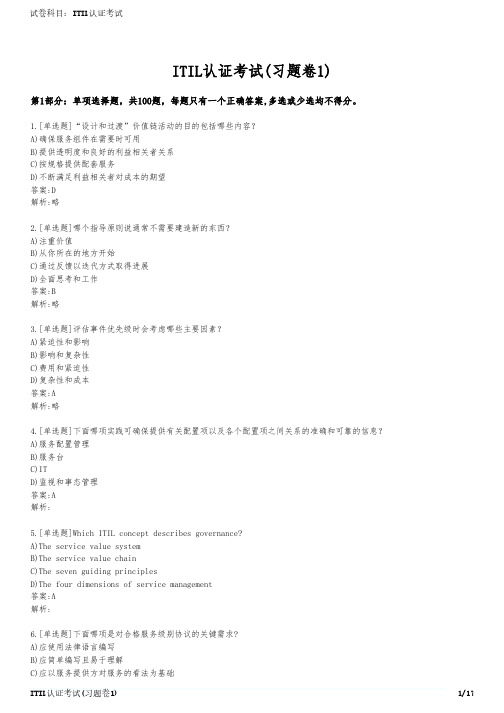
ITIL认证考试(习题卷1)第1部分:单项选择题,共100题,每题只有一个正确答案,多选或少选均不得分。
1.[单选题]“设计和过渡”价值链活动的目的包括哪些内容?A)确保服务组件在需要时可用B)提供透明度和良好的利益相关者关系C)按规格提供配套服务D)不断满足利益相关者对成本的期望答案:D解析:略2.[单选题]哪个指导原则说通常不需要建造新的东西?A)注重价值B)从你所在的地方开始C)通过反馈以迭代方式取得进展D)全面思考和工作答案:B解析:略3.[单选题]评估事件优先级时会考虑哪些主要因素?A)紧迫性和影响B)影响和复杂性C)费用和紧迫性D)复杂性和成本答案:A解析:略4.[单选题]下面哪项实践可确保提供有关配置项以及各个配置项之间关系的准确和可靠的信息?A)服务配置管理B)服务台C)ITD)监视和事态管理答案:A解析:5.[单选题]Which ITIL concept describes governance?A)The service value systemB)The service value chainC)The seven guiding principlesD)The four dimensions of service management答案:A解析:6.[单选题]下面哪项是对合格服务级别协议的关键需求?D)应与简单的运营指标相关答案:B解析:7.[单选题]下面哪个服务价值链活动涉及购买新产品?A)参与B)获取/构建C)计划D)改进答案:B解析:8.[单选题]下面哪项活动是“持续改进”实践的一部分?A)确定事件原因,并建议相关改进B)授权进行变更,以进行改进C)记录并管理可进行改进的事件D)为改进行动制订商业论证答案:D解析:9.[单选题]在“问题管理”中最早记录变通办法的时间是什么时候?A)记录问题后B)确定问题的优先级后C)分析问题后D)问题解决后答案:C解析:略10.[单选题]下面哪个服务管理维度考量活动之间的协调情况?A)组织和人员B)信息和技术C)合作伙伴与供应商D)价值流和流程答案:D解析:11.[单选题]下面哪项被定义为为交付 IT 服务而需要进行管理的任何组件?A)服务请求B)配置项 (CI)C)事件D)IT 资产答案:B解析:12.[单选题]下面哪一个不是自助式服务的例子?A)服务请求总是需要呼叫服务台B)前端页面C)基于菜单的自助服务和服务请求13.[单选题]下面哪项是添加、修改或删除可能对服务产生影响的任何内容?A)变更B)事态C)事件D)问题答案:A解析:14.[单选题]构成IT服务的项目的正确组合是什么?A)客户、提供商和文档B)信息技术、人员和流程C)信息技术、网络和人员D)人员、流程和客户答案:B解析:略15.[单选题]The addition, modification or removal of an authorized, planned or supported service or service component and its associated documentation is a definition of what? 添加、修改或删除授权,计划或支持服务或服务组件及其相关文件是用于定义什么的?A)A change 变更B)A change model 变更模型C)A change request 变更请求D)A change advisory board 变更咨询委员会答案:A解析:16.[单选题]How does customer engagement contribute to the 'service level management' practice?\1.It captures information that metrics can be based on\2.It ensures the organization meets defined service levels\3.It defines the workflows for service requests\4.It supports progress discussionsA)1 and 4B)3 and 4C)2 and 3D)1 and 2答案:A解析:17.[单选题]Which will NOT be handled as a service request?A)The degradation of a serviceB)The replacement of a toner cartridgeC)The provision of a laptopD)A complaint about a support team答案:A解析:18.[单选题]下面哪项实践可用于确定指标,以反映客户的服务体验?19.[单选题]组织如何让第三方供应商协助服务的持续改进?A)确保供应商在合同中详述他们的服务改进方案B)请求证明供应商使用了敏捷开发方式C)请求证明供应商通过项目管理实践实施了所有改进措施D)确保供应商的所有问题管理活动均可促成改进答案:A解析:20.[单选题]哪个层面侧重于与参与服务设计、开发、部署和交付的其他组织的关系?A)组织和人员B)信息和技术C)合作伙伴和供应商D)价值流和流程答案:C解析:略21.[单选题]下面哪两个表述与“优化和自动化”指导原则关联最大? 1. 评估各类利益相关者分别适用哪种沟通方法非常重要 2. 设计复杂系统的前提是了解组件的各个部分是如何互相关联的 3. 组织应该考量技术能否改进手动流程的效率 4. 评估潜在改进的影响时,了解组织的目标非常重要A)1 和 2B)2 和 3C)3 和 4D)1 和 4答案:B解析:22.[单选题]关于履行服务请求的步骤的哪个陈述是正确的?A)它们应该是复杂和详细的B)它们应该是众所周知的和经过验证的C)它们应包括事件处理D)它们应该简短明了答案:B解析:略23.[单选题]哪两个被认为是服务管理的“组织和人员”维度的一部分?1. 权力体系;2. 企业文化;3. 组织之间的关系;4. 工作流程A)1和2B)2和3C)3和4D)1和4答案:A解析:略24.[单选题]下面哪项实践的目的包括观察服务以报告选定的事态状态变更?25.[单选题]下面哪一项用于描述服务是否满足可用性、容量和安全需求?A)结果B)价值C)功用(Utility)D)功效(Warranty)答案:D解析:26.[单选题]What is defined as a cause, or potential cause, of one or more incidents?A)ChangeB)EventC)Known errorD)Problem答案:D解析:27.[单选题]哪个维度考虑数据安全和隐私?A)组织和人员B)信息和技术C)合作伙伴和供应商D)价值流和流程答案:B解析:略28.[单选题]下面哪两项关于“服务请求管理”实践的表述是正确的?1). 服务请求是一般服务交付的一部分2). 投诉可作为服务请求来处理3). 服务请求源自服务失效4). 正常变更应作为服务请求来处理A)1 和 2B)2 和 3C)3 和 4D)1 和 4答案:A解析:29.[单选题]哪些有助于简化服务请求的履行?A)了解哪些服务请求可以通过有限的审批完成B)为每个服务请求创建新的工作流C)将与服务故障相关的请求与服务降级分开D)消除具有复杂工作流程的服务请求答案:A解析:略C)服务请求管理D)服务级别管理答案:C解析:31.[单选题]An organization asks a stakeholder to review a planned change. Which guiding principle Does this demonstrate?A)Collaborate and promote visibilityB)Start where you areC)Focus on valueD)Keep it simple and practical答案:A解析:32.[单选题]什么是事态?A)对服务或其他配置项的管理有重大意义的状态变更B)为交付C)服务的意外中断或服务质量的下降D)任何能够给答案:A解析:33.[单选题]下面哪项实践要求员工展现出色的客户服务技能,如同理心和情商?A)问题管理B)供应商管理C)发布管理D)服务台答案:D解析:34.[单选题]下面哪项应在组织中保持不变,无论组织的目标是否变更?A)输出B)指导原则C)服务供给D)结果答案:B解析:35.[单选题]在服务关系中哪些利益相关者会共创价值?A)投资者和供应商B)消费者和提供方C)提供方和供应商D)投资者和消费者答案:B解析:36.[单选题]下面哪一项描述了指导原则的性质?A)指导原则可在任何情况下指导组织行动37.[单选题]什么时候可以生成已知错误记录?任何有用的时候2. 当发现规避措施以后A)只有1B)只有2C)两个都不是D)两个都是答案:C解析:38.[单选题]谁负责定义变更管理的关键性能指标(KPIs)?A)变更管理流程的负责人B)变更顾问委员会C)服务负责人D)持续服务改进经理答案:A解析:39.[单选题]哪个维度包括活动和工作流?A)组织和人员B)信息和技术C)合作伙伴和供应商D)价值流和流程答案:D解析:略40.[单选题]下面哪一项可作为组织的运营模型?A)服务管理的四个维度B)服务价值链C)ITIL 指导原则D)持续改进答案:B解析:41.[单选题]下列哪一项最好的描述了服务请求?A)用户对信息、建议或标准变更的请求B)客户想要而且准备为此而付费的所有事情C)由用户通过基于 web 的自助窗口输入所有请求和需要D)具有低风险而且无需通过变更顾问委员会(CAB)会议,可以由变更经理批准的所 有变更请求(RPC)答案:A解析:42.[单选题]这些活动中哪项是作为“问题管理”的一部分进行的?A)创建事件记录B)诊断和解决事件43.[单选题]哪项指导原则建议取消无助于创造价值的活动?A)从您现在的位置开始B)协作并提高可见性C)保持简单实用D)优化和自动化答案:C解析:略44.[单选题]“多级 SLA”是一个三层结构,下列哪层不是这样类型 SLA 的部分?A)客户级别B)服务级别C)公司级别D)配置级别答案:D解析:45.[单选题]下面哪项关于“持续改进”的表述是正确的?A)所有改进想法都应记录在单个“持续改进登记单”中B)应由一个团队在组织内部进行“持续改进”C)“持续改进”应尽量减少与其他实践的交互D)组织内的每一个人负责“持续改进”的一些方面答案:B解析:46.[单选题]什么是保修?A)保证产品或服务将满足商定的要求B)在特定活动或资源上花费的金额C)产品或服务为满足特定需求而提供的功能D)某事的感知益处、有用性和重要性答案:A解析:略47.[单选题]下面哪项应视为“合作伙伴与供应商”维度的一部分?A)组织间关系中涉及的整合和正式程度B)实现约定目标所需的活动、工作流、控制和程序C)在服务供应和消费过程中创建、管理和使用的信息D)组织团队与单独成员需具备的技能和能力答案:A解析:48.[单选题]What are guiding principles?A)A set of interconnected activities that help an organization deliver a valuable serviceB)A description of one or more services that help address the needs of a target consumer groupC)A set of specialized organizational capabilities for enabling value for customersD)Recommendations that help an organization when adopting a service management approach答案:DA)客户为服务交付指定的时间B)消费者对服务的需求C)实际提供服务所需的时间D)供应商的服务水平答案:D解析:略50.[单选题]Which of the following is an example of workaround?A)A defective network switch is replaced with a new oneB)An email server is restored after an incident is reportedC)Server memory is increased when the server is unresponsiveD)A server is restarted to resolve an incident答案:D解析:51.[单选题]将下面的句子补充完整。
高考英语外刊阅读及模拟强化训练:男子翻越围栏”撩“大熊猫 (教师版)
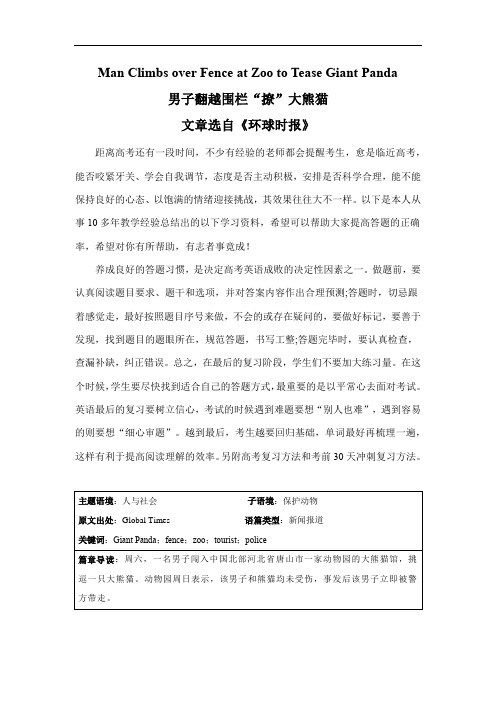
Man Climbs over Fence at Zoo to Tease Giant Panda男子翻越围栏“撩”大熊猫文章选自《环球时报》距离高考还有一段时间,不少有经验的老师都会提醒考生,愈是临近高考,能否咬紧牙关、学会自我调节,态度是否主动积极,安排是否科学合理,能不能保持良好的心态、以饱满的情绪迎接挑战,其效果往往大不一样。
以下是本人从事10多年教学经验总结出的以下学习资料,希望可以帮助大家提高答题的正确率,希望对你有所帮助,有志者事竟成!养成良好的答题习惯,是决定高考英语成败的决定性因素之一。
做题前,要认真阅读题目要求、题干和选项,并对答案内容作出合理预测;答题时,切忌跟着感觉走,最好按照题目序号来做,不会的或存在疑问的,要做好标记,要善于发现,找到题目的题眼所在,规范答题,书写工整;答题完毕时,要认真检查,查漏补缺,纠正错误。
总之,在最后的复习阶段,学生们不要加大练习量。
在这个时候,学生要尽快找到适合自己的答题方式,最重要的是以平常心去面对考试。
英语最后的复习要树立信心,考试的时候遇到难题要想“别人也难”,遇到容易的则要想“细心审题”。
越到最后,考生越要回归基础,单词最好再梳理一遍,这样有利于提高阅读理解的效率。
另附高考复习方法和考前30天冲刺复习方法。
原汁原味外刊阅读及模拟强化训练A man broke into the GiantPanda Pavilion of a zoo inTangshan, North China's HebeiProvince, on Saturday to tease agiant panda. Neither the man northe panda was harmed and theman was taken away by policeimmediately after the incident,the zoo said on Sunday.A video posted online shows a man crouching in front of an adult panda at the zoo and reaching out to touch its head, but the animal jerks away. The near-zero contact between the man and the giant panda prompted gasps from other visitors."Some tourists look for trouble. Everyone loves pandas, but they can't just do what they want!" said the netizen who posted the video.A staff member at the zoo told the media that the panda pavilion is equipped with a glass barrier to separate visitors from the pandas, and it's still unclear how the man got in. The man was taken away by police and security measures will be tightened at the zoo, the staff member added.The public concerns over giant panda Ya Ya in the US have grown into a spontaneous "campaign" among Chinese people all around the world to check how pandas are surviving at home and abroad."I hope Ya Ya and all pandas living at home and abroad can be treated well," said a netizen on the Chinese social media platform Sina Weibo.读后强化训练I. 单句语法填空1. It's one thing to tease (tease) your sister, but it's another to hit her.2. A firewall provides an essential security (secure) blanket for your computer network.3. There was no real barrier (屏障) between reality and fantasy in his mind.4. The time has come for action if these beautiful animals are to survive (survive).5. Stress at work is a matter of concern to staff (全体职工)and management.II.阅读理解1. What do we know about the man who teased the giant pandas?A. He is extremely fond of giant pandas.B. He climbed through the glass barrier.C. He frightened the giant panda.D. He did not suffer any physical harm.【答案】D【解析】细节理解题。
泛在媒体环境下的一类具有话题衍生性的SEIRS模型
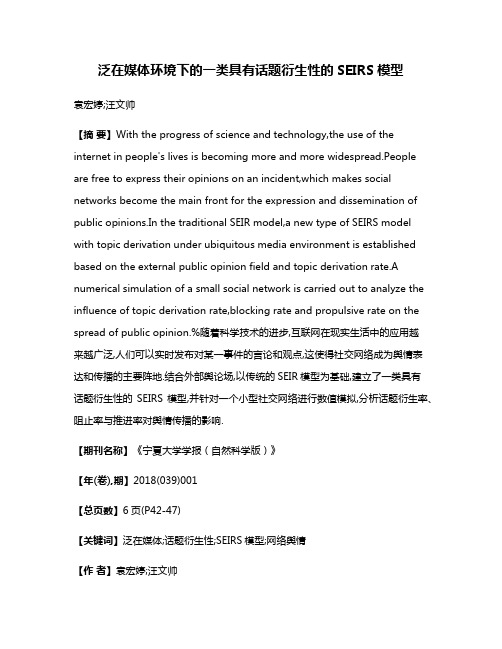
泛在媒体环境下的一类具有话题衍生性的SEIRS模型袁宏婷;汪文帅【摘要】With the progress of science and technology,the use of the internet in people's lives is becoming more and more widespread.People are free to express their opinions on an incident,which makes social networks become the main front for the expression and dissemination of public opinions.In the traditional SEIR model,a new type of SEIRS model with topic derivation under ubiquitous media environment is established based on the external public opinion field and topic derivation rate.A numerical simulation of a small social network is carried out to analyze the influence of topic derivation rate,blocking rate and propulsive rate on the spread of public opinion.%随着科学技术的进步,互联网在现实生活中的应用越来越广泛,人们可以实时发布对某一事件的言论和观点,这使得社交网络成为舆情表达和传播的主要阵地.结合外部舆论场,以传统的SEIR模型为基础,建立了一类具有话题衍生性的SEIRS模型,并针对一个小型社交网络进行数值模拟,分析话题衍生率、阻止率与推进率对舆情传播的影响.【期刊名称】《宁夏大学学报(自然科学版)》【年(卷),期】2018(039)001【总页数】6页(P42-47)【关键词】泛在媒体;话题衍生性;SEIRS模型;网络舆情【作者】袁宏婷;汪文帅【作者单位】宁夏大学数学统计学院,宁夏银川 750021;宁夏大学数学统计学院,宁夏银川 750021【正文语种】中文【中图分类】O175;O193近年来,随着信息时代的来临,一些焦点事件逐渐进入大众的视野,并受到广泛的关注,例如官员作风、医疗、教育、经济纠纷、住房等热点问题成为网络舆情的重要导火索.随着移动互联网的发展,微博、微信、博客等一系列手机客户端使信息传播变得更加广泛快捷,人们可以通过社交网络等渠道对某一事件或观点表达自己的见解,交流自己的看法,这使得社交网络成为网络舆情的主要传播媒介[1].网络舆情对社会公众会产生巨大影响,为使舆情朝着积极正确的方向发展,政府的隔离与推进成为治理不实消息的重要力量.因此传播内容、媒介和导向使得舆情传播的舆论场逐渐形成,而泛在媒体环境的形成,深刻影响着人们的生活.陈波等[2]将传统SEIR模型推广到泛在媒体环境中,基于Wiki技术实现了网络舆情的传播与控制,有效提高了网络舆情平台的自净能力.洪亮等[3]强调了泛在媒体环境下政府对于网络舆情治理的重要性,并提出相应的改善方法.由此,在这一信息高速流通的大背景下,信息传播机制的分析、干预等方面的研究就显得尤为必要.目前,对于网络舆情的研究方法主要借助于传染病模型.最早由Kermack提出的适用于传染病传播规律的模型为SIR[4]模型.Sudbury[5]最早用SIR模型模拟网络舆情传播.Anderson 和May以SIR模型为基础,加入潜伏态节点E,提出更符合舆情传播规律的SEIR模型[6].由于互联网技术的发展及社交媒体的繁荣,信息发布的渠道越来越多,人们每天接收的信息越来越繁杂,信息的传播变得越来越快速.这些都使得人们无暇理性看待所接触到的信息,对待信息越来越不理性,常常越离谱、越出格、越劲爆的消息越容易吸引人们的注意,并引起大量的评论、转发.在这一背景下,某一话题也会出现一些不实消息、偏激言论或其他相关的衍生话题.朱恒民等[7]考虑了微博的传播特性与舆情话题的衍生性,提出以有向无标度网络为载体的SIRS模型.陈福集等[8—9]提出基于话题衍生率的SEIRS模型,并分析了衍生效应的相关因素对舆情传播过程的影响.尹熙成等[10]将舆情传播的原话题与衍生话题建立在耦合网络模型上,发现衍生话题使舆情传播过程出现新的峰值.上述研究只是单方面地将泛在媒体环境应用到网络舆情的传播与控制模型中,或在传统模型的基础上考虑话题衍生性,而本文将在陈波[2]和陈福集[8—9]等人研究的基础上,结合外部舆论场,在传统的SEIR模型基础上,考虑话题衍生性,建立一类具有话题衍生性的SEIRS模型.然后对衍生率以及与外部舆论场有关的推进率、阻止率对舆情话题的影响做出分析.通过Matlab进行数值仿真,从实验角度论证,对于网络舆情政府应实时监控舆情信息,采取合理措施有效降低舆情风险.1 泛在媒体环境下的一类具有话题衍生性的SEIRS模型关于网络舆情的传播控制模型的研究已经受到广泛关注,传统的模型即为SEIR模型[5],其基本结构示意如图1所示.图1 SEIR模型在该模型中,将某一段时间内的网民分为4种类型:易感者(S),它表示在t时刻不知道舆情信息的网民;潜伏者(E),它表示在t时刻已经知道舆情信息但还在犹豫是否将该舆情信息传播出去的网民;感染者(I),它表示在t时刻收到舆情信息并将该信息立刻传播出去的网民;免疫者(R) ,它表示在t时刻接收到舆情信息但对该信息不感兴趣的网民.基于该传统的SEIR模型,本文构建了泛在媒体环境下加入衍生率的一种新SEIRS模型,图2是该模型的舆情传播示意图. 其中,A代表随时间进入话题的新网民输入率;ρ表示易感者接收到舆情信息后转化为潜伏者的概率;β表示潜伏者接收到信息后转化为感染者的概率;ε表示潜伏者接收到舆情信息后直接转化为免疫者的概率;γ表示感染者接收到舆情信息但对该条信息不感兴趣从而直接转化为免疫者的概率;δ表示免疫者重新变成易感者的概率.图2 改进的SEIRS模型为了方便理解,以下着重说明此模型引入的影响因子.ⅰ)话题衍生率:τ表示免疫者对接收到的不感兴趣的舆情信息以另一种相关的信息传播出去,即转化为感染者的概率;ⅱ)外部舆论场影响率:α表示由于一些外界因素(如政府采取的隔离措施),使潜伏者、易感者直接转化为免疫者的概率,即推进率;σ表示由于一些外界因素(如政府采取的引导措施),使潜伏者转化为感染者的概率,即阻止率.由传统SEIR模型[5]可知S(t)+E(t)+I(t)+R(t)=1.(1)建立如下网络舆情控制模型:(2)将 (2) 式代入 (1) 式中,可将模型转化为(3)在研究舆情传播时,需要关注舆情的传播时间,判断舆情话题何时停止传播.故需要求解系统的平衡点并分析各因素对传播的影响,提出相应的建议,有效控制舆情的肆意发展.2 模型的平衡点求解在研究网络舆情的传播过程中,关注的是舆情话题的传播效率.由传播动力学理论[11]可知,网络传播系统中都会存在一个传播的关键点——传播阈值M.它能很好地揭示网络舆情的传播规律和态势.当M>1时,舆情信息会在一定范围内传播;当M≤1时,舆情信息会逐渐消亡.因此,M决定了舆情传播的范围,且其大小受多个因素影响.以下分情况说明两种阈值的平衡点.(ⅰ)零传播平衡点当M≤1时,系统存在一个零传播平衡点,即随着时间的推移,舆情在网络环境中逐渐消亡,并不再扩散.当E、I、R都为0时,该传播系统中各个状态下的网民数量不会再变化,故S=1且E、I、R都为0时,这个状态即为该传播系统的零传播平衡点.(ⅱ)非零传播平衡点当M>1时,系统存在一个非零传播平衡点,即随着时间的推移,舆情逐渐趋于稳定,并在网络舆情中长期存在.令 (3) 式右端项等于0,可求得(4)将(4)式代入(1)式可得(5)(5)式中ρ表示传染度,根据传播动力学知识[11]可知ρ=λ(ρ1E+ρ2I),其中λ为接触率,ρ1和ρ2为传染率.再把ρ=λ(ρ1E+ρ2I)代入 (5) 式,可得(6)式(见附录,由于篇幅所限本节后续部分推导均可见附录).3 模型应用本节利用Matlab对建立的数学模型进行数值模拟,以验证各参考因子对舆情传播影响的正确性与合理性.在实验中用控制变量和对比分析的方法进行实验分析.针对一个规模为500人的网络进行研究,首先参照文献[8],假定各状态网民的人数为 S(0)=470,E(0)=15 ,I(0)=10 ,R(0)=5,各参数调为A=0.1,δ=0.2,ρ=0.3,β=0.2,σ=0.2,ε=0.3,α=0.2,γ=0.4,τ=0.2.将τ、σ、α作为变动参数,分析这些关键因素对舆情传播的影响.3.1 衍生率对舆情传播过程的影响话题衍生性是网络舆情传播的一个重要影响因素,一些话题由于自身或者外界原因,网民对原始话题不再感兴趣,从而衍生出新的话题.在数值模拟时,我们将没有产生话题衍生的情形设定为τ=0,其余参数设置为A=0.1,δ=0.2,ρ=0.3,β=0.2,σ=0.2,ε=0.3,α=0.2,γ=0.4;另外,当话题衍生率存在时,分别取τ=0.5,τ=0.75,τ=0.9作为对照组,其余参数不变.在这个过程中,各个状态下网民人数的变化趋势如图3所示.由图3可以看出,随着衍生率τ的增大,S、E、I、R达到平衡的时间延长,说明衍生率的存在使得舆情话题的生命力更加持久;而在衍生率τ增大的过程中,达到平衡时,I的数量是随之上升的,即接收到舆情信息并立即传播的网民人数增多,与此同时,R的数量随之下降,这表明大部分网民对舆情信息的免疫力下降,即对舆情信息感兴趣的网民人数上升,这使得舆情消息的传播更为广泛.图3 衍生率对舆情传播的影响因此,衍生率的存在与舆情消息的传播密不可分,政府应该极力引导正确的舆论方向,及时公布信息的进展,消除谣言,降低话题衍生率,避免产生更多虚假的衍生消息,使得舆情消息迅速得到有效控制.3.2 外部舆论场对舆情传播过程的影响3.2.1 外部舆论场阻止率σ对舆情传播过程的影响外部舆论场对舆情传播的影响一方面体现在外部舆论场阻止率,即由于一些外界因素(如政府采取的引导措施),使潜伏者转化为感染者的概率.在数值模拟时,将没有阻止率时的参数设置为σ=0,其余参数设置为A=0.1,δ=0.2,ρ=0.3,β=0.2,ε=0.3,α=0.2,γ=0.4,τ=0.2;另外,当阻止率存在时,分别取σ=0.5,σ=0.75,σ=0.9作为对照组,其余参数不变.在这个过程中,各个状态下网民人数的变化趋势如图4所示.图4 阻止率对舆情传播的影响从图4可以看出,随着阻止率的增加, E快速达到峰值且峰值减小,随后缓慢下降且达到平衡状态时的数量减少,即处在峰值的潜伏态网民人数减少,这说明政府的正确引导能减少在媒体环境中不知舆情真实性的网民数量;而I达到平衡状态时的数量上升且达到平衡所需时间缩短,这说明在政府的引导下,一些属实消息的传播数量上升且快速进入稳定状态;S与R几乎不发生变化,说明阻止率并不影响易感者与免疫者的数量,只是在舆情信息传播过程中促使更多的潜伏者转化为感染者. 基于上述分析,如果政府采取一些正向引导措施,严格规范网民言论相关制度,舆情话题的传播将朝着收敛性和可控性方向发展且舆情消息会更快地消散,这对舆情的防控和危机化解工作十分有利.3.2.2 外部舆论场推进率α对舆情传播过程的影响外部舆论场对舆情传播的影响另一方面是外部舆论场推进率,即由于一些外界因素(如政府采取的隔离措施),使潜伏者和感染者转化为免疫者的概率.在数值模拟时,将没有推进率时的参数设置为α=0,其余参数设置为A=0.1,ρ=0.3,β=0.2,σ=0.2,ε=0.3,δ=0.2,γ=0.4,τ=0.2;另外,当推进率存在时,分别取α=0.5,α=0.75,α=0.9作为对照组,其余参数不变.在这个过程中,各个状态下的网民人数的变化趋势如图5所示.图5 推进率对舆情传播的影响从图5可以看出,随着推进率α的增加,S、E、I、R达到平衡的时间缩短,说明推进率的增大使得舆情话题的生命力变得脆弱;E与I的峰值随着推进率α的增大而减小,同时R的数量快速增加,说明推进率的增大使潜伏态与感染态的网民快速转化为免疫态.通过上述分析,我们可以总结出以下规律:随着推进率的增大,潜伏态与感染态的网民人数大幅度减少,免疫态网民人数升高,说明政府可采取一些隔离措施使人们对舆情信息的浏览量下降,并直接转化为免疫者,舆情信息影响力的下降,有利于控制舆情的肆意传播.4 结语本文对一个规模为500人左右的小型社交网络建立一种新的SEIRS网络舆情传播演化模型,并用Matlab软件进行数值模拟.该模型将外部舆论场与话题衍生性同时考虑在内,呈现了网络舆情传播过程中一些参数对各状态下的网民人数的影响曲线,分析话题衍生性、阻止率以及推进率对舆情传播的影响.实验表明,改进的模型能更好地说明衍生率与外部舆论场对社交网络的影响.参考文献:[1] 陈兵.社交网络、网络舆情与政府应对[J].中国出版,2012(08):69-71.[2] 陈波,于泠,刘君亭,等.泛在媒体环境下的网络舆情传播控制模型[J].系统工程理论与实践,2011,31(11):2140-2150.[3] 洪亮,石立艳,孙永波.泛在媒体环境下政府网络舆情治理能力提升研究[J].情报探索,2017(06):20-26.[4] KERMACK W O, Mc KENDRICK A G. A contribution to the mathematical theory of epidemics[C]// Proceedings of the Royal Society of London. Series A: Mathematical, Physical and Engineering Science. The Royal Science, 1927,115(772):700-721.[5] SUDBURY A. The proportion of the population never hearing arumour[J]. Journal of Applied Probability,1985,22(2):443-446.[6] ANDERSON R,MAY R. Infectious diseases of humans:dynamics and control [M]. Oxford:Oxford University Press,1991.[7] 朱恒民,李青.面向话题衍生性的微博网络舆情传播模型研究[J].现代图书情报技术,2012(05):60-64.[8] 陈福集,陈婷,郑小雪.一类新SEIRS模型上的网络舆情传播行为研究[J].情报资料工作,2014(04):62-67.[9] 陈福集,陈婷.基于SEIRS传播模型的网络舆情衍生效应研究[J].情报杂志,2014,33(02):108-113.[10] 尹熙成,朱恒民,马静,等.微博舆情话题传播的耦合网络模型——分析话题衍生性特征与用户阅读心理[J].情报理论与实践,2015,38(11):82-86.[11] 廖晓昕.动力系统的稳定性理论和应用[M].北京:国防工业出版社,2000.。
大众媒体和社交媒体英语作文
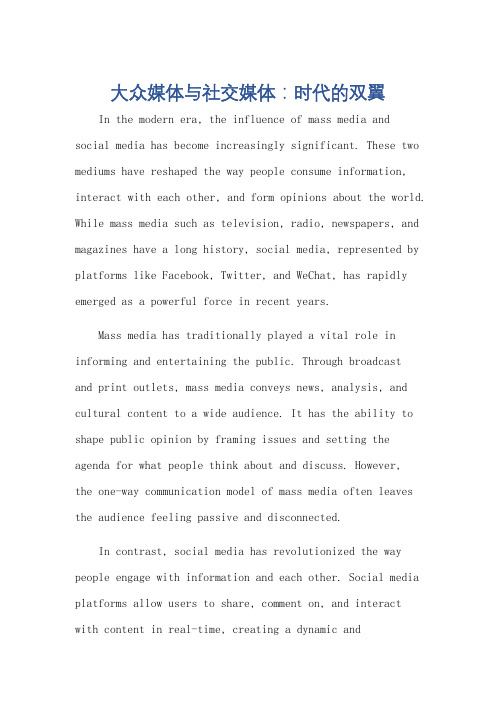
大众媒体与社交媒体:时代的双翼In the modern era, the influence of mass media andsocial media has become increasingly significant. These two mediums have reshaped the way people consume information, interact with each other, and form opinions about the world. While mass media such as television, radio, newspapers, and magazines have a long history, social media, represented by platforms like Facebook, Twitter, and WeChat, has rapidly emerged as a powerful force in recent years.Mass media has traditionally played a vital role in informing and entertaining the public. Through broadcastand print outlets, mass media conveys news, analysis, and cultural content to a wide audience. It has the ability to shape public opinion by framing issues and setting the agenda for what people think about and discuss. However,the one-way communication model of mass media often leaves the audience feeling passive and disconnected.In contrast, social media has revolutionized the way people engage with information and each other. Social media platforms allow users to share, comment on, and interactwith content in real-time, creating a dynamic andinteractive environment. This two-way communication model encourages active participation and fosters a sense of community among users. Social media has also given rise to a new breed of content creators, such as bloggers, influencers, and vloggers, who have the ability to reach a large audience and influence their opinions.However, while social media has brought about many positive changes, it has also presented new challenges. One such challenge is the issue of information overload. With so much content being generated and shared on social media, it can be difficult for users to sift through and separate the wheat from the chaff. This can lead to misinformation and fake news spreading rapidly, sometimes with harmful consequences.Another challenge is the issue of privacy and security. Social media platforms often collect vast amounts of personal data about their users, which can be misused or leaked, leading to privacy breaches and identity theft. This has raised concerns about the ethics andresponsibility of social media companies in protecting user data.Despite these challenges, the influence of mass media and social media on society remains undeniable. They have the power to shape public opinion, influence behavior, and drive social change. It is important, therefore, for individuals to be aware of the influence of these mediums and to use them responsibly. This includes being discerning about the information they consume, being mindful of their privacy settings, and engaging in meaningful and respectful interactions with others.In conclusion, mass media and social media are two important wings of the modern era, each with its own strengths and challenges. By understanding and harnessing the power of these mediums, we can inform ourselves, connect with others, and shape a better world.**大众媒体与社交媒体:时代的双翼**在现代社会,大众媒体和社交媒体的影响力日益显著。
社交媒体的看法总结英语
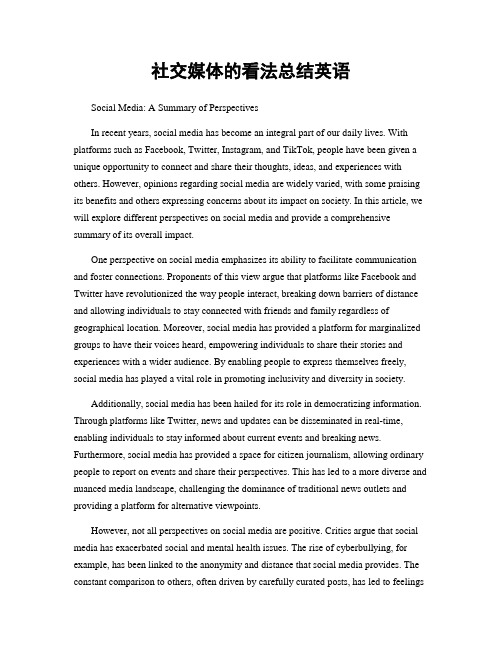
社交媒体的看法总结英语Social Media: A Summary of PerspectivesIn recent years, social media has become an integral part of our daily lives. With platforms such as Facebook, Twitter, Instagram, and TikTok, people have been given a unique opportunity to connect and share their thoughts, ideas, and experiences with others. However, opinions regarding social media are widely varied, with some praising its benefits and others expressing concerns about its impact on society. In this article, we will explore different perspectives on social media and provide a comprehensive summary of its overall impact.One perspective on social media emphasizes its ability to facilitate communication and foster connections. Proponents of this view argue that platforms like Facebook and Twitter have revolutionized the way people interact, breaking down barriers of distance and allowing individuals to stay connected with friends and family regardless of geographical location. Moreover, social media has provided a platform for marginalized groups to have their voices heard, empowering individuals to share their stories and experiences with a wider audience. By enabling people to express themselves freely, social media has played a vital role in promoting inclusivity and diversity in society.Additionally, social media has been hailed for its role in democratizing information. Through platforms like Twitter, news and updates can be disseminated in real-time, enabling individuals to stay informed about current events and breaking news. Furthermore, social media has provided a space for citizen journalism, allowing ordinary people to report on events and share their perspectives. This has led to a more diverse and nuanced media landscape, challenging the dominance of traditional news outlets and providing a platform for alternative viewpoints.However, not all perspectives on social media are positive. Critics argue that social media has exacerbated social and mental health issues. The rise of cyberbullying, for example, has been linked to the anonymity and distance that social media provides. The constant comparison to others, often driven by carefully curated posts, has led to feelingsof inadequacy and low self-esteem in many individuals. Moreover, the addictive nature of social media, characterized by the constant need for validation through likes and comments, has raised concerns about its impact on mental well-being. Studies have shown a correlation between excessive social media use and increased rates of anxiety and depression.Furthermore, social media has been accused of facilitating the spread of misinformation and fake news. The viral nature of platforms like Facebook and Twitter allows false information to be shared rapidly, often reaching a large audience before it can be fact-checked. This has serious implications for public discourse and decision-making processes. The lack of gatekeepers on social media platforms has also raised concerns about the potential for manipulation and the spread of propaganda, as seen in the case of foreign interference in elections.In conclusion, social media is a complex phenomenon with both positive and negative aspects. While it has undeniably revolutionized communication and information sharing, it has also brought about new challenges and risks. The impact of social media on society is not yet fully understood, and ongoing research is necessary to assess its long-term effects. It is crucial for individuals and society as a whole to navigate the world of social media with awareness, critical thinking, and responsible usage, in order to maximize its benefits and mitigate its drawbacks.。
《The Influence of Social Networks on Society》高考优秀英
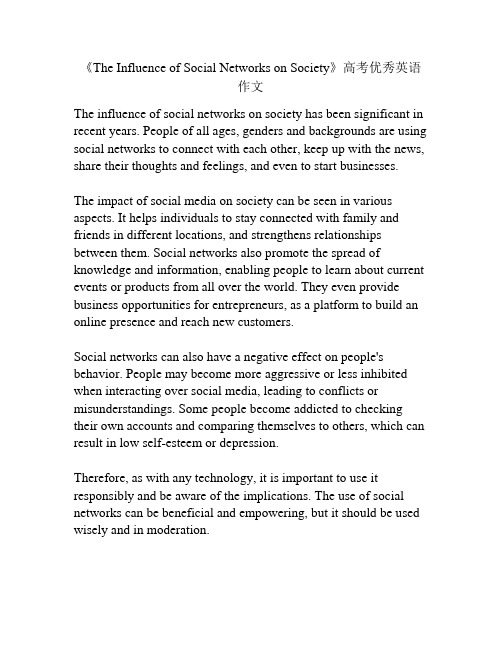
《The Influence of Social Networks on Society》高考优秀英语作文The influence of social networks on society has been significant in recent years. People of all ages, genders and backgrounds are using social networks to connect with each other, keep up with the news, share their thoughts and feelings, and even to start businesses.The impact of social media on society can be seen in various aspects. It helps individuals to stay connected with family and friends in different locations, and strengthens relationships between them. Social networks also promote the spread of knowledge and information, enabling people to learn about current events or products from all over the world. They even provide business opportunities for entrepreneurs, as a platform to build an online presence and reach new customers.Social networks can also have a negative effect on people's behavior. People may become more aggressive or less inhibited when interacting over social media, leading to conflicts or misunderstandings. Some people become addicted to checking their own accounts and comparing themselves to others, which can result in low self-esteem or depression.Therefore, as with any technology, it is important to use it responsibly and be aware of the implications. The use of social networks can be beneficial and empowering, but it should be used wisely and in moderation.。
The Impact of Social Media on Society
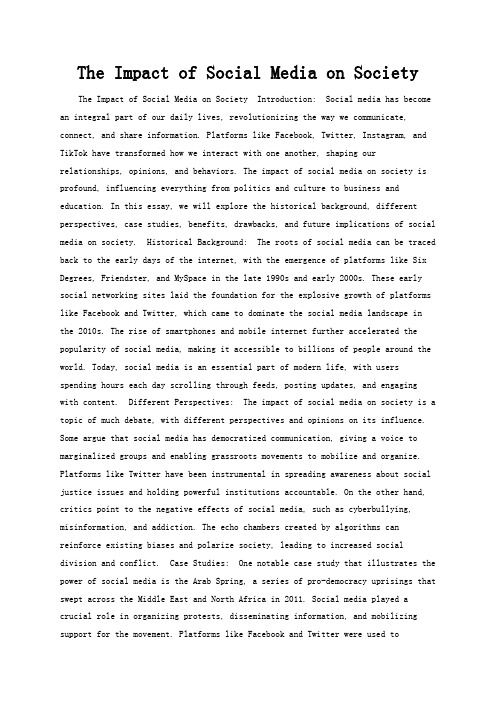
The Impact of Social Media on Society The Impact of Social Media on Society Introduction: Social media has become an integral part of our daily lives, revolutionizing the way we communicate, connect, and share information. Platforms like Facebook, Twitter, Instagram, and TikTok have transformed how we interact with one another, shaping our relationships, opinions, and behaviors. The impact of social media on society is profound, influencing everything from politics and culture to business and education. In this essay, we will explore the historical background, different perspectives, case studies, benefits, drawbacks, and future implications of social media on society. Historical Background: The roots of social media can be traced back to the early days of the internet, with the emergence of platforms like Six Degrees, Friendster, and MySpace in the late 1990s and early 2000s. These early social networking sites laid the foundation for the explosive growth of platforms like Facebook and Twitter, which came to dominate the social media landscape in the 2010s. The rise of smartphones and mobile internet further accelerated the popularity of social media, making it accessible to billions of people around the world. Today, social media is an essential part of modern life, with users spending hours each day scrolling through feeds, posting updates, and engaging with content. Different Perspectives: The impact of social media on society is a topic of much debate, with different perspectives and opinions on its influence. Some argue that social media has democratized communication, giving a voice to marginalized groups and enabling grassroots movements to mobilize and organize. Platforms like Twitter have been instrumental in spreading awareness about social justice issues and holding powerful institutions accountable. On the other hand, critics point to the negative effects of social media, such as cyberbullying, misinformation, and addiction. The echo chambers created by algorithms can reinforce existing biases and polarize society, leading to increased social division and conflict. Case Studies: One notable case study that illustrates the power of social media is the Arab Spring, a series of pro-democracy uprisings that swept across the Middle East and North Africa in 2011. Social media played a crucial role in organizing protests, disseminating information, and mobilizing support for the movement. Platforms like Facebook and Twitter were used tocoordinate demonstrations, share videos of police brutality, and connect activists across borders. The Arab Spring demonstrated the potential of social media to catalyze political change and challenge authoritarian regimes. Benefits and Drawbacks: Social media offers a wide range of benefits to society, including increased connectivity, access to information, and opportunities for self-expression. Platforms like Instagram and YouTube have empowered individuals to showcase their talents, build communities, and monetize their content. Social media has also revolutionized the way businesses market their products and engage with customers, opening up new avenues for growth and innovation. However, the drawbacks of social media cannot be ignored. The spread of fake news, hate speech, and misinformation poses a serious threat to democracy and public discourse. The addictive nature of social media can also have negative effects on mental health, leading to feelings of anxiety, depression, and loneliness. Future Implications: Looking ahead, the future implications of social media on society are uncertain.As technology continues to evolve, new platforms and features will emerge, shaping how we communicate and interact online. It is essential for policymakers, businesses, and users to consider the ethical implications of social media andwork towards creating a more inclusive, transparent, and responsible digital environment. Education and media literacy will be key in navigating the complexities of social media and empowering individuals to critically evaluate information and engage thoughtfully with online content. By fostering a culture of digital citizenship and ethical behavior, we can harness the potential of social media to create a more connected, informed, and empathetic society. In conclusion, the impact of social media on society is multifaceted, with both positive and negative consequences. While social media has the power to amplify voices, foster connections, and drive social change, it also poses risks to privacy, mental health, and democratic values. By critically evaluating the role of social mediain our lives and taking steps to mitigate its negative effects, we can ensure that technology serves as a force for good in society. As we navigate the complexities of the digital age, it is essential to approach social media with a critical eye,a compassionate heart, and a commitment to building a more inclusive and equitable future for all.。
社交媒体对青年人的影响英语作文
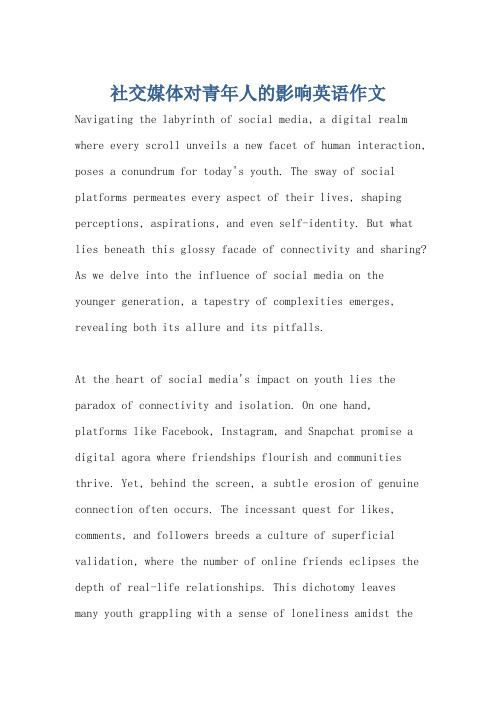
社交媒体对青年人的影响英语作文Navigating the labyrinth of social media, a digital realm where every scroll unveils a new facet of human interaction, poses a conundrum for today's youth. The sway of social platforms permeates every aspect of their lives, shaping perceptions, aspirations, and even self-identity. But what lies beneath this glossy facade of connectivity and sharing? As we delve into the influence of social media on the younger generation, a tapestry of complexities emerges, revealing both its allure and its pitfalls.At the heart of social media's impact on youth lies the paradox of connectivity and isolation. On one hand, platforms like Facebook, Instagram, and Snapchat promise a digital agora where friendships flourish and communities thrive. Yet, behind the screen, a subtle erosion of genuine connection often occurs. The incessant quest for likes, comments, and followers breeds a culture of superficial validation, where the number of online friends eclipses the depth of real-life relationships. This dichotomy leaves many youth grappling with a sense of loneliness amidst thevirtual clamor.Moreover, social media's influence extends far beyond the realm of social interaction, seeping into the fabric ofself-perception. The curated perfection of Instagram feeds and the relentless comparison fostered by Snapchat streaks erect an unattainable standard of beauty and success. For impressionable minds still in the throes of self-discovery, this constant barrage of filtered reality can sow seeds of insecurity and inadequacy. The pressure to conform to societal ideals propagated by influencers and celebrities becomes an ever-present specter, shaping identities in its wake.Yet, amid the tumult of digital noise, glimmers of empowerment and activism emerge as a beacon of hope. Social media platforms serve as catalysts for social change, amplifying voices that were once marginalized. From climate activism to movements for racial equality, the digital landscape becomes a battleground for advocacy and awareness. The youth harness the power of hashtags and viral campaigns to mobilize masses, effecting tangible change in the worldaround them. In this light, social media emerges not only as a force for self-indulgence but also as a tool for collective action and societal progress.Nevertheless, the shadows cast by social media loom large, casting doubt upon its long-term implications for youth mental health. The relentless exposure to curated content cultivates a skewed perception of reality, fostering feelings of inadequacy and discontent. The incessant dopamine rush triggered by likes and notifications fuels a cycle of addiction, ensnaring young minds in a digital labyrinth from which escape seems elusive. The rise of cyberbullying and online harassment further compounds these issues, leaving scars that may never fully heal.In conclusion, the influence of social media on today's youth is a double-edged sword, wielding both the power to connect and the potential to divide. As we navigate this digital landscape, we must remain vigilant, recognizing the nuances that lie beneath the surface. Empowering the youth with digital literacy and critical thinking skills becomes paramount, enabling them to navigate the pitfalls of socialmedia while harnessing its potential for positive change. Only then can we hope to strike a balance between connectivity and authenticity in the digital age.。
网络安全事件应急预案英文
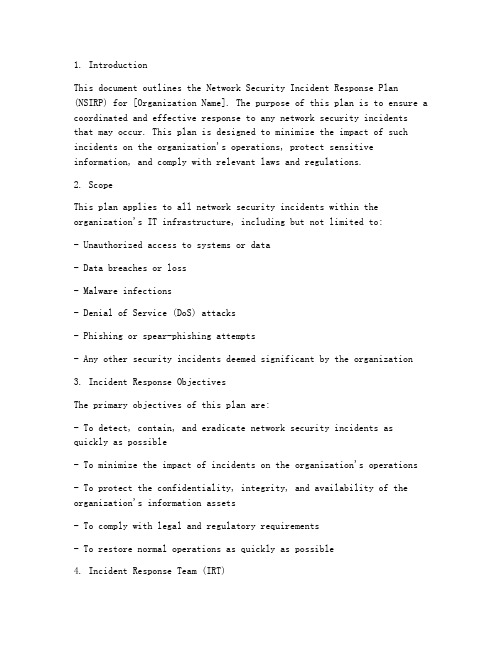
1. IntroductionThis document outlines the Network Security Incident Response Plan (NSIRP) for [Organization Name]. The purpose of this plan is to ensure a coordinated and effective response to any network security incidentsthat may occur. This plan is designed to minimize the impact of such incidents on the organization's operations, protect sensitive information, and comply with relevant laws and regulations.2. ScopeThis plan applies to all network security incidents within the organization's IT infrastructure, including but not limited to:- Unauthorized access to systems or data- Data breaches or loss- Malware infections- Denial of Service (DoS) attacks- Phishing or spear-phishing attempts- Any other security incidents deemed significant by the organization3. Incident Response ObjectivesThe primary objectives of this plan are:- To detect, contain, and eradicate network security incidents asquickly as possible- To minimize the impact of incidents on the organization's operations- To protect the confidentiality, integrity, and availability of the organization's information assets- To comply with legal and regulatory requirements- To restore normal operations as quickly as possible4. Incident Response Team (IRT)The Incident Response Team (IRT) will be responsible for managing the response to network security incidents. The IRT will consist of the following roles:- Incident Manager: Responsible for overseeing the incident response process and ensuring that all necessary actions are taken.- Technical Analysts: Responsible for investigating and analyzing incidents, identifying the root cause, and providing recommendations for remediation.- Communications Officer: Responsible for communicating with internal and external stakeholders regarding incidents.- Legal and Compliance Specialist: Responsible for ensuring that the organization's response to incidents complies with all relevant laws and regulations.- Business Continuity Manager: Responsible for ensuring that the organization's business operations are not significantly disrupted during an incident.5. Incident Response Procedures5.1 Detection- Continuous monitoring of network traffic, system logs, and security alerts for signs of suspicious activity.- Regularly reviewing security reports and conducting security audits.5.2 Analysis- Immediate assessment of the incident to determine its severity and potential impact.- Identification of the affected systems, data, and users.- Collection of evidence and data for analysis.5.3 Containment- Isolation of affected systems to prevent the spread of the incident.- Implementation of temporary measures to mitigate the impact of the incident.5.4 Eradication- Removal or mitigation of the cause of the incident.- Cleaning and securing affected systems to prevent recurrence.5.5 Recovery- Restoration of affected systems and data from backups.- Verification of system functionality and security.5.6 Post-Incident Review- Conducting a thorough investigation to determine the root cause of the incident.- Updating policies, procedures, and controls as necessary to prevent future incidents.- Documenting the incident and its resolution for future reference.6. Communication Plan- Immediate notification of senior management and relevant stakeholders.- Regular updates to all stakeholders as the situation evolves.- Coordination with external entities, such as law enforcement or regulatory agencies, as required.7. Training and Awareness- Regular training for all employees on cybersecurity best practices and incident response procedures.- Awareness campaigns to promote a security-conscious culture within the organization.8. Appendices- Contact information for the Incident Response Team and other relevant parties.- Detailed incident response procedures and guidelines.- Templates for incident reports and other documentation.9. Review and UpdateThis plan will be reviewed and updated annually or as needed to reflect changes in the organization's IT infrastructure, threat landscape, or regulatory requirements.10. ApprovalThis Network Security Incident Response Plan has been reviewed and approved by [Approver's Name], [Approver's Title], [Organization Name], on [Date].---Note: This document is a template and should be customized to fit the specific needs and circumstances of the organization.。
避免成为网络犯罪受害者的提示的英语作文
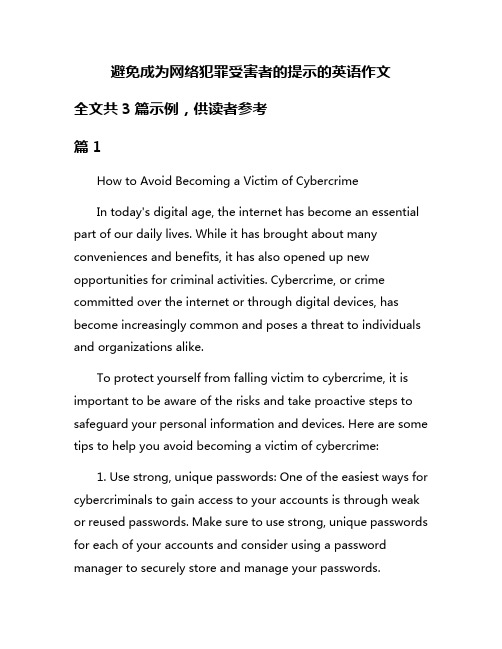
避免成为网络犯罪受害者的提示的英语作文全文共3篇示例,供读者参考篇1How to Avoid Becoming a Victim of CybercrimeIn today's digital age, the internet has become an essential part of our daily lives. While it has brought about many conveniences and benefits, it has also opened up new opportunities for criminal activities. Cybercrime, or crime committed over the internet or through digital devices, has become increasingly common and poses a threat to individuals and organizations alike.To protect yourself from falling victim to cybercrime, it is important to be aware of the risks and take proactive steps to safeguard your personal information and devices. Here are some tips to help you avoid becoming a victim of cybercrime:1. Use strong, unique passwords: One of the easiest ways for cybercriminals to gain access to your accounts is through weak or reused passwords. Make sure to use strong, unique passwords for each of your accounts and consider using a password manager to securely store and manage your passwords.2. Keep your software up to date: Software vulnerabilities can be exploited by cybercriminals to gain unauthorized access to your devices. To prevent this, make sure to regularly update your operating system, apps, and antivirus software to the latest versions.3. Be cautious of phishing scams: Phishing scams involve fraudulent emails, messages, or websites that attempt to trick you into providing sensitive information such as usernames, passwords, or financial details. Be wary of unsolicited emails and messages, and avoid clicking on links or downloading attachments from unknown sources.4. Secure your wireless network: If you use a wireless network at home or in public places, make sure to secure it with a strong password and encryption. This will help prevent unauthorized users from accessing your network and intercepting your data.5. Enable two-factor authentication: Two-factor authentication adds an extra layer of security to your accounts by requiring a second form of verification, such as a code sent to your phone, in addition to your password. Enable this feature whenever possible to protect your accounts from unauthorized access.6. Avoid sharing personal information online: Be cautious about sharing personal information such as your address, phone number, or social security number online. Limit the amount of personal information you share on social media platforms and be mindful of the privacy settings on your accounts.7. Backup your data regularly: In the event of a cyberattack or data breach, having backups of your important files and documents can help minimize the impact of the incident. Make sure to regularly backup your data to an external hard drive or cloud storage service.8. Monitor your financial accounts: Keep a close eye on your bank and credit card statements for any unauthorized transactions or suspicious activity. Report any discrepancies to your financial institution immediately to prevent further loss or damage.By following these tips and staying vigilant in your online activities, you can reduce your risk of becoming a victim of cybercrime. Remember that prevention is key when it comes to protecting yourself and your information online. Stay informed, stay proactive, and stay safe in the digital world.篇2How to Avoid Becoming a Victim of CybercrimeCybercrime is a growing concern in today's digital world, with hackers and scammers constantly finding new ways to target unsuspecting individuals. It is important to take precautions to protect yourself from becoming a victim of cybercrime. Here are some tips to help you stay safe online:1. Use strong, unique passwords for all your online accounts. Avoid using easily guessable passwords such as "123456" or "password." Instead, create complex passwords with a mix of letters, numbers, and special characters.2. Enable two-factor authentication on all your accounts. Two-factor authentication adds an extra layer of security by requiring you to provide a second form of verification, such as a code sent to your phone, in addition to your password.3. Be cautious when clicking on links or downloading attachments in emails or messages from unknown sources. These could be phishing attempts designed to steal your personal information.4. Keep your software and devices up to date. Make sure to install the latest updates and security patches for your operatingsystem, antivirus software, and other programs to protect against vulnerabilities.5. Avoid sharing sensitive information such as your social security number, credit card details, or passwords online unless it is on a secure, trusted website.6. Be wary of public Wi-Fi networks. Avoid accessing sensitive information or making financial transactions on public Wi-Fi networks, as they are often unsecured and can be easily compromised by hackers.7. Use reputable antivirus software and firewall protection on your devices to detect and prevent malware and other malicious software from infecting your system.8. Regularly back up your important files and data to a secure external storage device or cloud service. In the event of a cyber attack, you can restore your data without paying a ransom to hackers.9. Be careful about what you post on social media. Avoid sharing personal information such as your full name, address, phone number, or birthdate publicly, as this information can be used by cybercriminals to target you.10. Be vigilant and report any suspicious activity or potential cyber threats to the appropriate authorities. If you believe you have been a victim of cybercrime, contact your local law enforcement agency or report it to the Internet Crime Complaint Center (IC3) at .By following these tips and practicing good cybersecurity hygiene, you can reduce the risk of becoming a victim of cybercrime and protect yourself online. Stay safe and stay vigilant!篇3With the rapid development of the internet, cybercrimes have become more prevalent in recent years. From identity theft to online scams, individuals are constantly at risk of falling victim to various online threats. However, by taking certain precautions and being aware of potential dangers, you can greatly reduce the likelihood of becoming a victim of cybercrime. In this article, we will discuss some tips on how to avoid becoming a victim of cybercrime.First and foremost, it is important to protect your personal information online. Be cautious about sharing sensitive information such as your social security number, bank accountdetails, and passwords on the internet. Make sure to use strong and unique passwords for your accounts, and consider enabling two-factor authentication for an added layer of security.Secondly, be wary of phishing scams. Phishing is a method used by cybercriminals to trick individuals into providing personal information by posing as a legitimate entity. Be cautious of emails or messages that ask for sensitive information or contain suspicious links. Always verify the authenticity of the sender before responding to any requests for information.Additionally, be mindful of the websites you visit and the links you click on. Visit only reputable websites and avoid clicking on pop-up ads or suspicious links. Malicious websites can infect your device with malware, compromising your personal information and security.Furthermore, regularly update your devices and software to protect against security vulnerabilities. Cybercriminals often exploit outdated software to gain access to your personal information. Set your devices to automatically install updates and patches to ensure that you have the latest security measures in place.Lastly, educate yourself on common cyber threats and how to recognize them. Stay informed about the latest types ofcybercrimes and familiarize yourself with warning signs of potential scams. By being vigilant and proactive in protecting your personal information online, you can reduce the risk of falling victim to cybercrime.In conclusion, while the internet offers countless benefits and conveniences, it is important to be cautious and mindful of potential online threats. By following the tips mentioned above and staying informed about cyber security best practices, you can greatly reduce the risk of becoming a victim of cybercrime. Remember, prevention is key when it comes to protecting yourself online. Stay safe, stay informed, and stay secure in the digital world.。
保证网络安全的英语作文
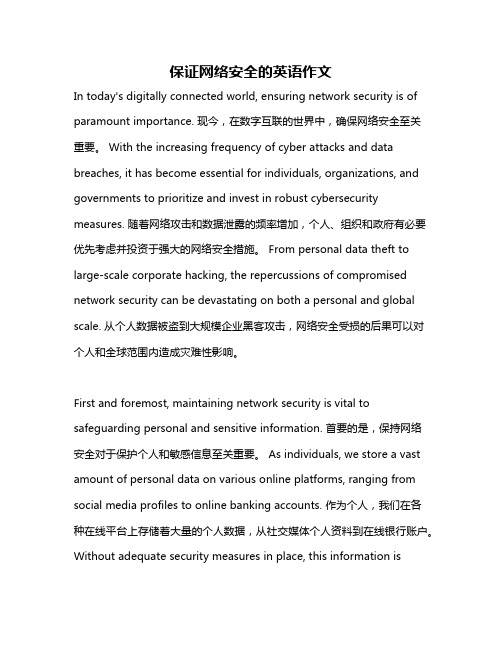
保证网络安全的英语作文In today's digitally connected world, ensuring network security is of paramount importance. 现今,在数字互联的世界中,确保网络安全至关重要。
With the increasing frequency of cyber attacks and data breaches, it has become essential for individuals, organizations, and governments to prioritize and invest in robust cybersecurity measures. 随着网络攻击和数据泄露的频率增加,个人、组织和政府有必要优先考虑并投资于强大的网络安全措施。
From personal data theft to large-scale corporate hacking, the repercussions of compromised network security can be devastating on both a personal and global scale. 从个人数据被盗到大规模企业黑客攻击,网络安全受损的后果可以对个人和全球范围内造成灾难性影响。
First and foremost, maintaining network security is vital to safeguarding personal and sensitive information. 首要的是,保持网络安全对于保护个人和敏感信息至关重要。
As individuals, we store a vast amount of personal data on various online platforms, ranging from social media profiles to online banking accounts. 作为个人,我们在各种在线平台上存储着大量的个人数据,从社交媒体个人资料到在线银行账户。
关于上网遇到的问题以及解决方案英语作文

关于上网遇到的问题以及解决方案英语作文全文共3篇示例,供读者参考篇1The Internet has become an essential part of our daily lives, offering us endless opportunities for communication, information access, and entertainment. However, as we navigate the online world, we often encounter various problems that can hinder our experience. In this essay, I will discuss common issues faced while using the internet and provide some effective solutions to address them.One of the most prevalent problems when surfing the web is slow internet connection. Slow speeds can be frustrating, especially when trying to stream videos, download files, or play online games. To resolve this issue, users can try several solutions. First, they can restart their modem or router, as this can often help improve connection speeds. Additionally, they can check for any background applications consuming bandwidth and close them to free up resources. Another option is to upgrade their internet plan to a higher speed package offered by their service provider.Another common issue internet users face is security threats such as viruses, malware, and phishing scams. These threats can compromise personal information, steal passwords, and even damage devices. To protect themselves against such threats, users should install reliable antivirus software, keep their operating system and applications up to date, and avoid clicking on suspicious links or email attachments. It is also essential to use strong and unique passwords for each online account to prevent unauthorized access.Furthermore, online privacy concerns have become a significant issue in recent years. Many websites and online services collect user data for targeted advertising and analytics, raising concerns about data security and privacy. To safeguard their privacy, users can take several measures. They can use a virtual private network (VPN) to encrypt their internet connection and hide their IP address from prying eyes. Additionally, they can regularly review and adjust privacy settings on social media platforms and other online services to control the information shared with third parties.Moreover, online censorship and restricted access to certain websites or content pose challenges for internet users in some regions. To bypass censorship and access blocked websites,users can use tools like proxies, VPNs, or the Tor browser. These tools can help users evade government restrictions and access information freely and securely.In conclusion, while the internet offers numerous benefits and opportunities, users must be aware of the common problems they may encounter and take proactive steps to address them. By following the solutions outlined above, users can enhance their online experience, stay safe and secure, and access information and services with ease. Ultimately, awell-informed and cautious approach can help internet users navigate the online world confidently and enjoy all that it has to offer.篇2With the rapid development of the Internet, more and more people are spending a significant amount of time online. While the Internet has brought great convenience and opportunities, it has also brought about various problems that users may encounter. In this article, we will discuss some common issues that people may face while surfing the web and provide some effective solutions.One common problem that many Internet users encounter is online privacy and security. With the increasing number of cyber attacks and data breaches, it is essential for users to protect their personal information and sensitive data. To address this issue, users should take proactive measures such as using strong and unique passwords, enabling two-factor authentication, and installing reliable antivirus software. It is also important to be cautious when sharing personal information online and to avoid clicking on suspicious links or downloading unknown files.Another frequent problem that users may face is slow internet speed. Slow internet can be frustrating and can hamper productivity and enjoyment. To solve this issue, users can try resetting their router, clearing their browser's cache, and running a speed test to determine the root cause of the problem. In some cases, upgrading to a higher internet speed plan or switching to a different internet service provider may be necessary.Furthermore, online harassment and cyberbullying are serious issues that many people confront while using the Internet. If you are a victim of online harassment, it is important to block the perpetrator, report the incident to the website or platform where it occurred, and seek support from friends, family, or a counselor. It is also crucial to avoid engaging with theharasser and to keep evidence of the harassment, such as screenshots or messages.Moreover, misinformation and fake news are rampant on the internet, making it difficult for users to distinguish between fact and fiction. To combat this problem, users should critically evaluate the information they come across online, fact-check news stories from reputable sources, and be cautious of sensational headlines or clickbait articles. Additionally, users can follow reliable journalists and fact-checking websites to stay informed and informed.In conclusion, while the Internet offers numerous benefits and opportunities, it also poses various challenges and risks for users. By being aware of the common problems that may arise while surfing the web and taking proactive measures to address them, users can enjoy a safe and secure online experience. Remember to prioritize your online privacy and security, troubleshoot slow internet speed, report online harassment, and verify information to navigate the digital world with confidence.篇3Title: Common Problems Encountered While Surfing the Internet and Their SolutionsIntroductionIn today's digital age, the internet has become an integral part of our daily lives. From communicating with others to accessing information, the internet offers endless possibilities. However, sometimes we may encounter certain problems while surfing the web. In this article, we will discuss some common issues faced by internet users and provide solutions to help overcome them.Problem 1: Slow Internet SpeedOne of the most common problems internet users face is slow internet speed. Slow loading times can be frustrating, especially when trying to stream videos or download files.Solution:There are several steps you can take to improve your internet speed. First, check your internet connection and ensure that your devices are properly connected to the network. You can also try resetting your modem or router to refresh the connection. Additionally, closing unused tabs and applications can help free up bandwidth and improve speed.Problem 2: Pop-Up AdsAnother annoyance that internet users often encounter is pop-up ads. These intrusive advertisements can disrupt your browsing experience and may even contain malware.Solution:To combat pop-up ads, you can install ad-blocking software or browser extensions. These tools can help prevent unwanted ads from appearing on your screen. Additionally, you can configure your browser settings to block pop-ups automatically.Problem 3: Security ThreatsWith the rise of cybercrime, online security is a major concern for internet users. Threats such as malware, phishing scams, and identity theft pose serious risks to your personal information.Solution:To protect yourself from security threats, it is important to install antivirus software on your devices. Make sure to keep your software updated to guard against new threats. Avoid clicking on suspicious links or downloading unknown files, as these can expose you to malware. Finally, use strong passwords and enable two-factor authentication for added security.Problem 4: Poor Website DesignNavigating a poorly designed website can be frustrating and time-consuming. Websites with cluttered layouts, confusing navigation, or broken links can hinder your browsing experience.Solution:If you encounter a poorly designed website, try using a different browser or device to see if the issue persists. You can also provide feedback to the website owner or developer to help improve the site's usability. In some cases, clearing your browser's cache and cookies can resolve loading issues.ConclusionWhile the internet offers countless benefits, it also presents challenges that can hinder your online experience. By being aware of common problems and implementing the solutions discussed in this article, you can navigate the web with ease and enjoy all that the internet has to offer. Remember to stay vigilant and proactive in addressing any issues that may arise while surfing the internet.。
- 1、下载文档前请自行甄别文档内容的完整性,平台不提供额外的编辑、内容补充、找答案等附加服务。
- 2、"仅部分预览"的文档,不可在线预览部分如存在完整性等问题,可反馈申请退款(可完整预览的文档不适用该条件!)。
- 3、如文档侵犯您的权益,请联系客服反馈,我们会尽快为您处理(人工客服工作时间:9:00-18:30)。
The name "Wang Sicong" is a certain association to his father Wang Jianlin, a real estate tycoon who made him an "affluent second generation." Any topic, as long as Wang Sicong is involved, is bound to cause sensation.
Wang, who spent most of his previous years abroad, made his first public appearance in China in 2011, when he accused Zhang Lan, chairman of the restaurant chain South Beauty on Weibo for libel, although the tweet was soon deleted.
Wang amused the public again at June, 2014, when he accused , an online department store, of not showing due respect to customers, because the online store failed to delivered his inexpensive computer desk on time. Online people found it amusing that the son of a billionaire would buy such an inexpensive table and actually cared about the shipping. The shopping incident brought Wang to the attention of online women, some of whom imagined him as their "husband" and called him “National husband”.
The incidents of Wang Sicong make us to consider the special
group----affluent second generation. Some of them are wealthy in knowledge, but some of them are extravagant and dissipated. Most of them has received first-rate education in developed countries, and the multicultural society broaden their horizons. However, whether the rich material life is good for their personality and ability is a problem that difficult to answer.
And I remember that t here were many negative incidents about the affluent second genneration which were reported by the media.Such as flaunt
wealth ,commit a crime.So the education of the affluent second generation is more and more important.The parents should budget more time to communicate to their children. In a world ,it is the duty of both the parents and the society.。
